Special Report
Every State's Rules for Staying At Home and Social Distancing
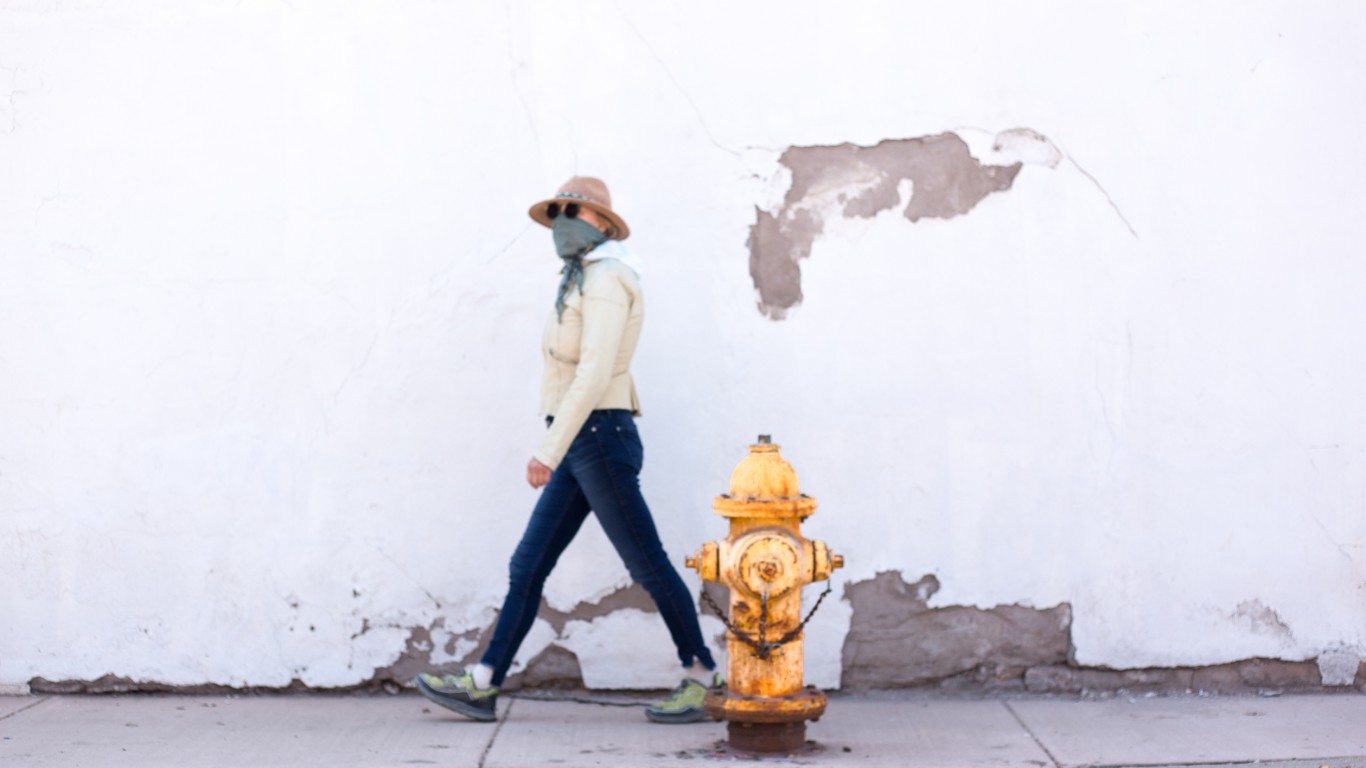
Published:
Last Updated:

Most of the United States is in lockdown, as Americans are doing their part in the fight against the novel coronavirus — COVID-19 has killed over 50,000 people in the U.S. as of April 24. All but eight states still have stay-at-home orders in effect, though some are beginning to ease restrictions.
To slow the spread of the coronavirus and save lives by keeping the local health care systems from being overwhelmed, each state has implemented its own set of rules — at different times and at varying limitations.
To determine each state’s social distancing measures and restrictions on movement, 24/7 Wall St. reviewed executive orders from governors since the first COVID-19 case was confirmed in the United States at the end of January.
Stay-at-home orders have halted travel and disrupted everyday lives for most Americans. The governors of some states have waited weeks after the first confirmed case in their states to issue such orders.
A minority of people, albeit a very vocal one, have started protesting the orders. They are pressing for an end to the restrictions even though the coronavirus continues to spread across the United States. Here are the states where COVID-19 is spreading the fastest right now.
While many people may feel confined and resist giving up their right to go outside or travel freely, there is some evidence that social distancing limitations are working and the rate of daily new infections is slowing.
Click here for every state’s rules for staying at home.
To determine every state’s rules on social distancing and restrictions on movement, 24/7 Wall St. reviewed each state’s governor executive orders since the first COVID-19 case was confirmed in the United States at the end of January.
Data on COVID-19 confirmed cases and related deaths came from the Centers for Disease Control and Prevention as well as from state and local health departments. The number of COVID-19 tests every state has conducted as of April 24 also came from state and local health departments.
Alabama
> Confirmed COVID-19 cases as of April 24: 119.3 per 100,000 — 25th lowest (total: 5,832)
> COVID-19 related deaths as of April 24: 4.0 per 100,000 — 25th highest (total: 197)
> Tests as of April 24: 1,077.0 per 100,000 — 24th highest (total: 52,641)
> Days between first case on 3/13/2020 and statewide stay-at-home effective date (4/4/2020): 22
> Population: 4,887,871
All Alabama schools are closed for the remainder of the 2019-20 school year. Nonessential businesses closed on March 28. All non-work related gatherings of 10 or more people are prohibited. The stay-at-home order expires at the end of April. The governor is considering reopening the economy after that.
[in-text-ad]
Alaska
> Confirmed COVID-19 cases as of April 24: 45.7 per 100,000 — 3rd lowest (total: 337)
> COVID-19 related deaths as of April 24: 1.2 per 100,000 — 5th lowest (total: 09)
> Tests as of April 24: 1,555.8 per 100,000 — 15th highest (total: 11,473)
> Days between first case on 3/12/2020 and statewide stay-at-home effective date (3/28/2020): 16
> Population: 737,438
The stay-at-home order expired on April 21. The state government is planning to open the economy in phases beginning April 24. Nonessential businesses are still closed under the mandates. K-12 schools are closed for the rest of the school year.
Arizona
> Confirmed COVID-19 cases as of April 24: 80.4 per 100,000 — 13th lowest (total: 5,769)
> COVID-19 related deaths as of April 24: 3.5 per 100,000 — 19th lowest (total: 249)
> Tests as of April 24: 818.5 per 100,000 — 17th lowest (total: 58,697)
> Days between first case on 1/26/2020 and statewide stay-at-home effective date (3/31/2020): 65
> Population: 7,171,646
The stay-at-home order ends on April 30, unless extended. Residents can only leave their places of residence for essential activities, such as grocery shopping or obtaining necessary supplies and services for their family or pets. Elective medical procedures would be allowed to resume May 1 with restrictions. K-12 schools are closed for the rest of the school year.
Arkansas
> Confirmed COVID-19 cases as of April 24: 86.5 per 100,000 — 15th lowest (total: 2,606)
> COVID-19 related deaths as of April 24: 1.5 per 100,000 — 7th lowest (total: 45)
> Tests as of April 24: 1,176.0 per 100,000 — 19th highest (total: 35,443)
> Days between first case on 3/11/2020 and statewide stay-at-home effective date: No order issued as of April 8
> Population: 3,013,825
There was no statewide stay-at-home order as of April 24. However, gatherings are restricted to no more than 10 people. Anywhere outside people must maintain 6 feet distance. Businesses that require significant person-to-person interaction are closed. Commercial lodgings and rentals are only open for people providing essential services. Schools are closed until further notice. The state government is planning to ease restrictions starting May 4.
[in-text-ad-2]
California
> Confirmed COVID-19 cases as of April 24: 100.2 per 100,000 — 19th lowest (total: 39,620)
> COVID-19 related deaths as of April 24: 3.9 per 100,000 — 24th lowest (total: 1,531)
> Tests as of April 24: N/A
> Days between first case on 1/25/2020 and statewide stay-at-home effective date (3/19/2020): 54
> Population: 39,557,045
A stay-at-home order has been in effect since March 19 and will remain so until further notice. Day cares are still open, but only for children of parents working in essential sectors. Gov. Gavin Newsom has begun discussions with neighboring states about reopening. However, rules such as wearing masks in restaurants and bans against large gatherings will stay in place through the summer. Schools are closed through the rest of the school year.
Colorado
> Confirmed COVID-19 cases as of April 24: 197.7 per 100,000 — 15th highest (total: 11,262)
> COVID-19 related deaths as of April 24: 9.7 per 100,000 — 12th highest (total: 552)
> Tests as of April 24: 918.7 per 100,000 — 19th lowest (total: 52,324)
> Days between first case on 3/5/2020 and statewide stay-at-home effective date (3/26/2020): 21
> Population: 5,695,564
The stay-at-home order was extended until April 26. The plan is to not extend it and begin a phased opening on April 27. The state would then enter a “safer at home” phase, where residents are recommended to stay home but not required to by law. Grocery stores, firearm stores, marijuana dispensaries, and gas stations are among the businesses considered essential and remain open. State parks are open, but playgrounds and picnic areas are closed. No gatherings of more than 10 people are allowed.
[in-text-ad]
Connecticut
> Confirmed COVID-19 cases as of April 24: 646.6 per 100,000 — 4th highest (total: 23,100)
> COVID-19 related deaths as of April 24: 45.9 per 100,000 — 3rd highest (total: 1,639)
> Tests as of April 24: 2,001.2 per 100,000 — 11th highest (total: 71,497)
> Days between first case on 3/8/2020 and statewide stay-at-home effective date (3/23/2020): 15
> Population: 3,572,665
A stay-at-home order is in effect until May 20. The state plans to start reopening in June. Grocery stores operate at half capacity. “Safe stores” guidelines are mandated, with every other register line out of service. A 6-foot minimum distance is required outdoors. Parking capacity is limited at certain parks, and walk-ins are banned to limit the number of visitors. Restaurants are still open for delivery or takeout.
Delaware
> Confirmed COVID-19 cases as of April 24: 342.0 per 100,000 — 8th highest (total: 3,308)
> COVID-19 related deaths as of April 24: 9.5 per 100,000 — 13th highest (total: 92)
> Tests as of April 24: N/A
> Days between first case on 3/11/2020 and statewide stay-at-home effective date (3/24/2020): 13
> Population: 967,171
The stay-at-home order requires that people remain in their homes and avoid going out in public unless they are engaged in an “essential activity” or “essential travel” until May 15 or until the health threat is eliminated. When out, people must maintain at least a 6-foot distance from each other. All beaches are closed except for people exercising or walking their dogs. People can still go out to get groceries, exercise, take care of others, and for other essential activities. Schools will be closed through the rest of the school year.
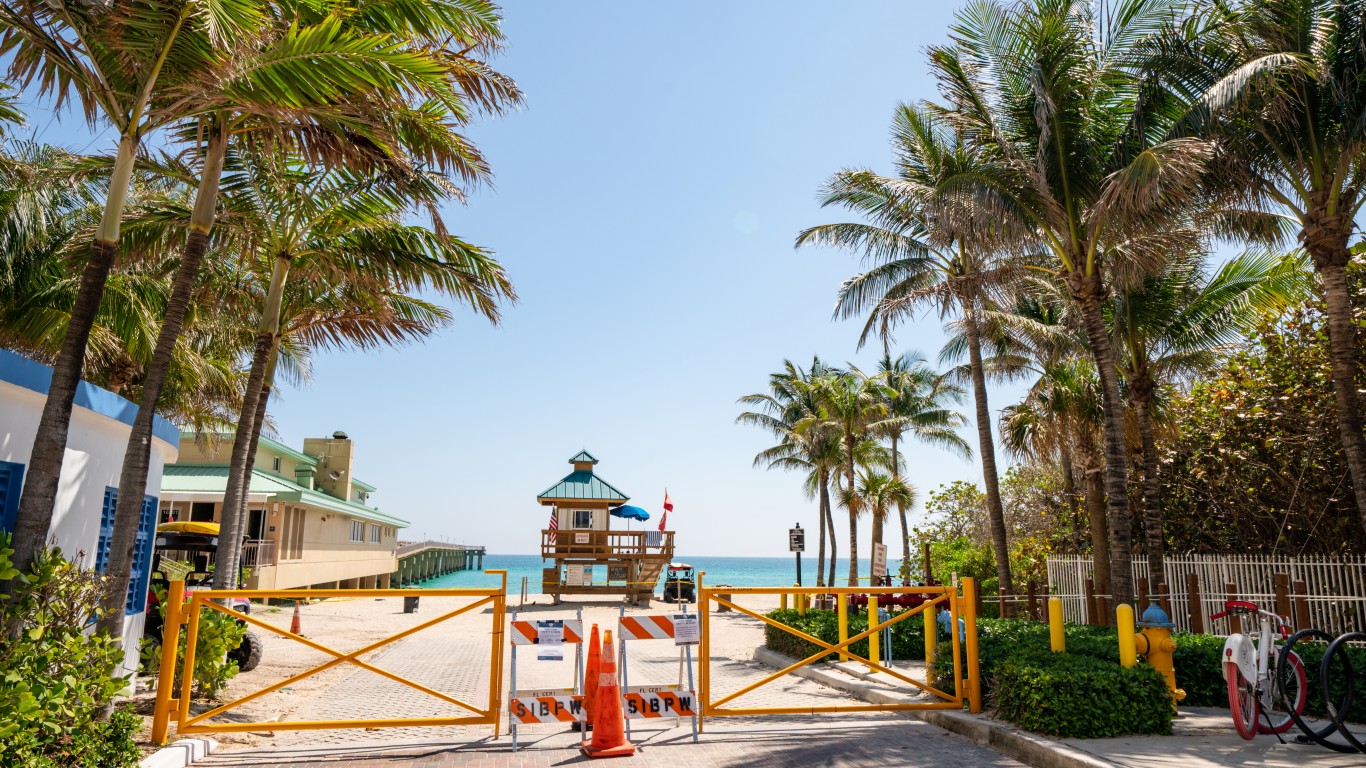
Florida
> Confirmed COVID-19 cases as of April 24: 141.7 per 100,000 — 18th highest (total: 30,174)
> COVID-19 related deaths as of April 24: 4.8 per 100,000 — 20th highest (total: 1,012)
> Tests as of April 24: 1,496.9 per 100,000 — 17th highest (total: 318,827)
> Days between first case on 3/1/2020 and statewide stay-at-home effective date (4/3/2020): 33
> Population: 21,299,325
Social distancing guidelines are in place at least until mid-May. A stay-at-home order is in effect until April 30. Beaches reopened for “essential activities” in parts of the state on April 17. People can still go outside for exercise or to go fishing. The WWE was declared an essential business and can operate during the stay-at-home order. Senior citizens and individuals with significant underlying medical conditions must stay at home. K-12 schools are closed for the rest of the school year.
[in-text-ad-2]
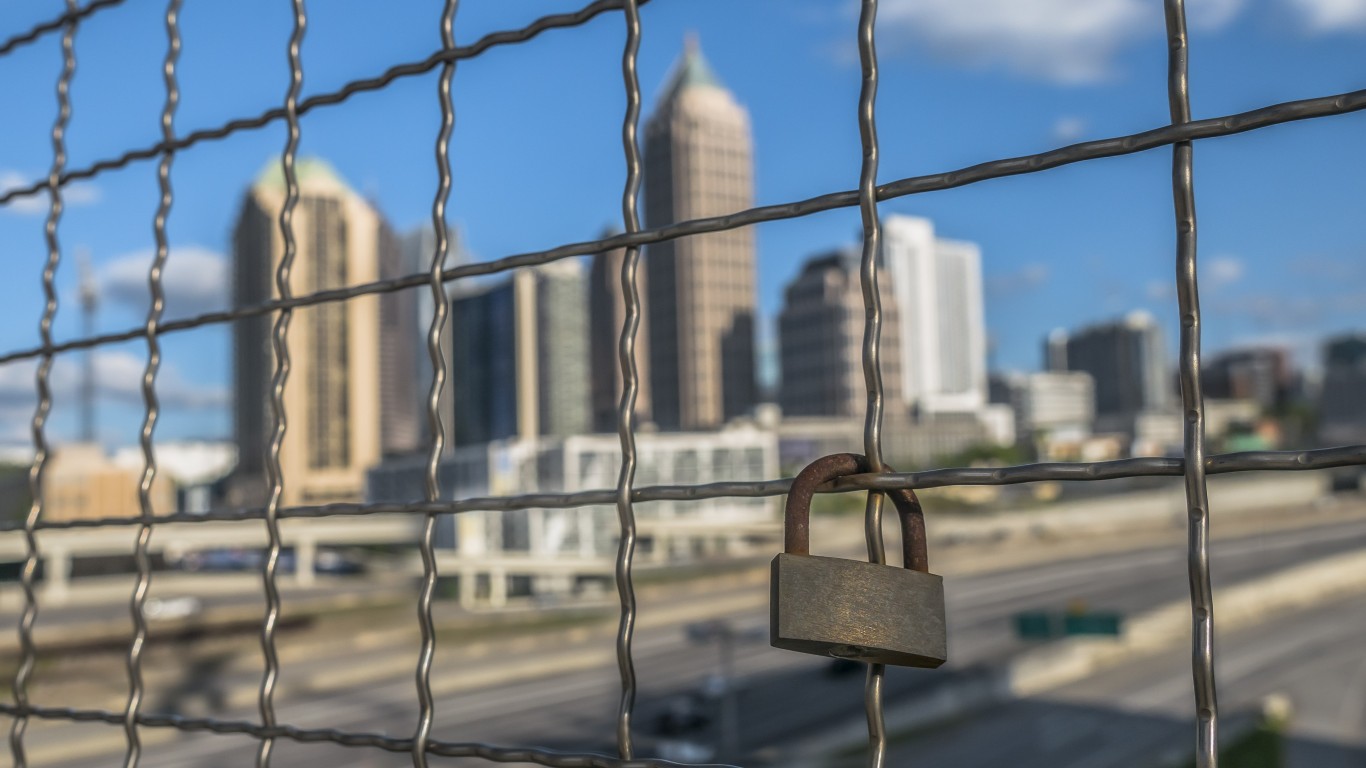
Georgia
> Confirmed COVID-19 cases as of April 24: 210.5 per 100,000 — 13th highest (total: 22,147)
> COVID-19 related deaths as of April 24: 8.5 per 100,000 — 15th highest (total: 892)
> Tests as of April 24: 1,018.8 per 100,000 — 24th lowest (total: 107,176)
> Days between first case on 3/2/2020 and statewide stay-at-home effective date (4/3/2020): 32
> Population: 10,519,475
A shelter-in-place order in effect at least until April 30. Some businesses, including gyms and hair salons, will be allowed to reopen and elective surgeries are to resume beginning April 24. Child care facilities are open but can take no more than 10 people, including teachers. Some beaches and parks are closed.
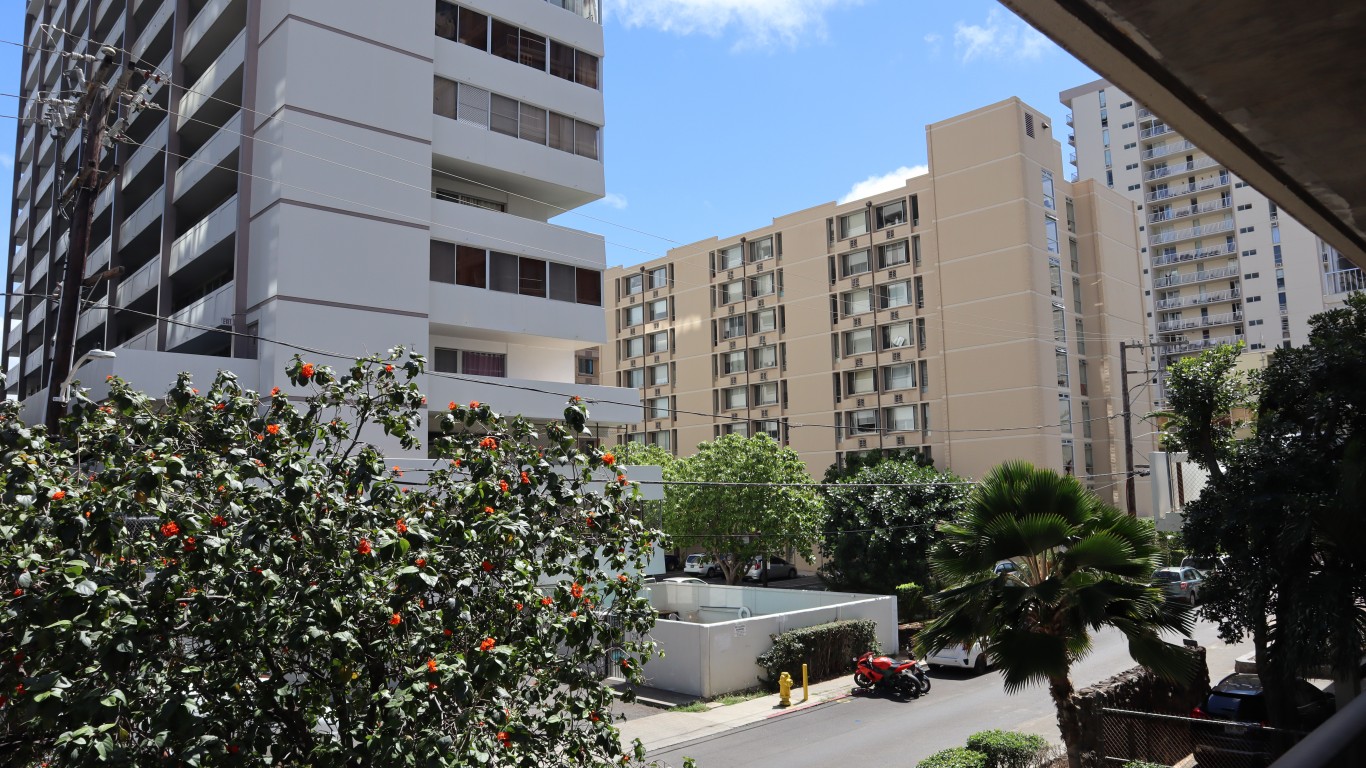
Hawaii
> Confirmed COVID-19 cases as of April 24: 42.0 per 100,000 — 2nd lowest (total: 596)
> COVID-19 related deaths as of April 24: 0.8 per 100,000 — the lowest (total: 12)
> Tests as of April 24: N/A
> Days between first case on 3/6/2020 and statewide stay-at-home effective date (3/25/2020): 19
> Population: 1,420,491
People must quarantine themselves for two weeks if traveling between islands or risk fines up to $5,000 and a year in prison. Only people seeking medical attention may leave their quarantine zones, which is the location residents have specified to be their quarantine zone on the mandatory State of Hawaii Department of Agriculture Plants and Animals Declaration Form. Stay-at-home, work-at-home orders are in effect for Honolulu and Maui through April 30. The state government will be taking a phased-in approach to reopening the economy. Schools are closed through the rest of the school year.
[in-text-ad]

Idaho
> Confirmed COVID-19 cases as of April 24: 104.7 per 100,000 — 21st lowest (total: 1,836)
> COVID-19 related deaths as of April 24: 3.1 per 100,000 — 16th lowest (total: 54)
> Tests as of April 24: 1,088.3 per 100,000 — 23rd highest (total: 19,091)
> Days between first case on 3/13/2020 and statewide stay-at-home effective date (3/25/2020): 12
> Population: 1,754,208
The stay-at-home order was extended until the end of April. Out-of-state visitors must self-isolate. Grocery shopping and outdoor activities are permitted so long as residents maintain 6 feet distance. Hunting and fishing seasons continue as long as people follow social distancing guidelines. Essential tribal operations can remain open. Some nonessential businesses can reopen on May 1 but have to “prepare operational plans” that include limits on the number of people in a business at a time.
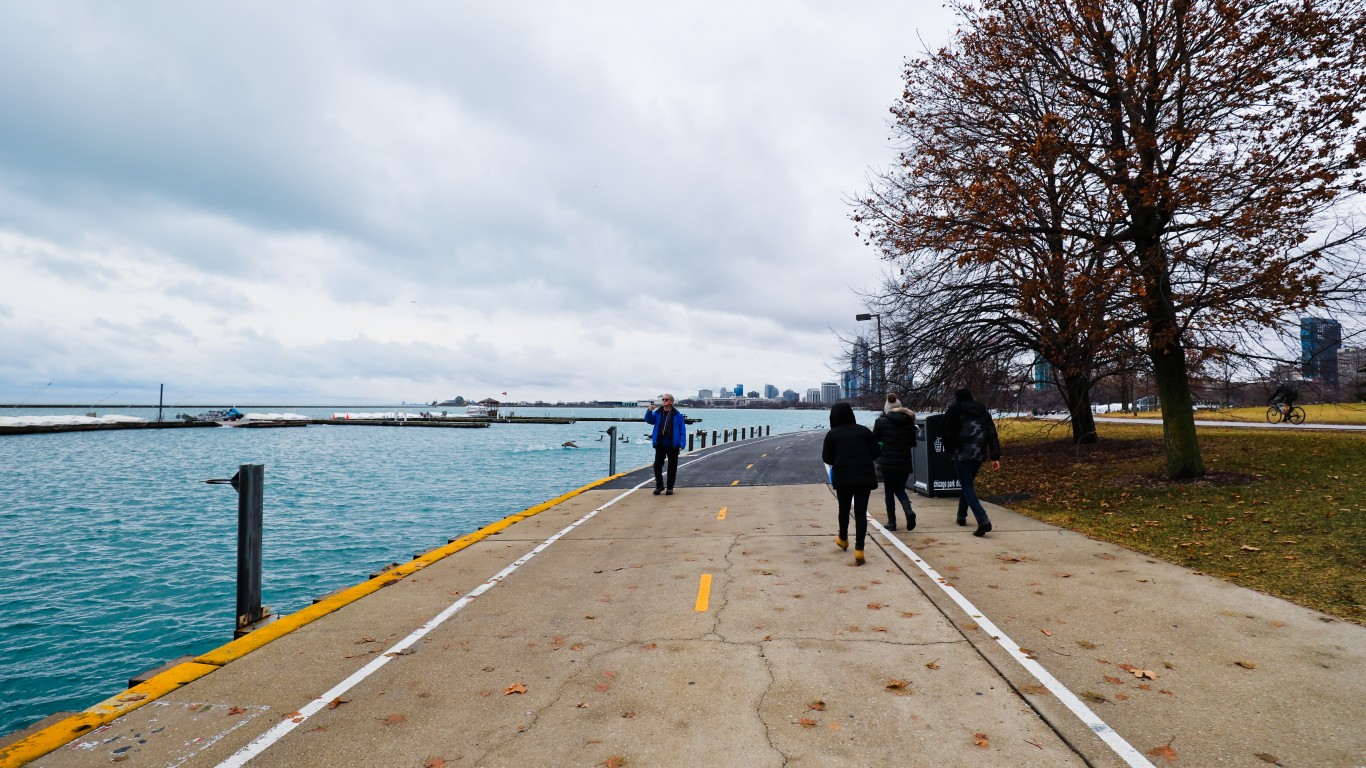
Illinois
> Confirmed COVID-19 cases as of April 24: 289.9 per 100,000 — 10th highest (total: 36,934)
> COVID-19 related deaths as of April 24: 13.2 per 100,000 — 8th highest (total: 1,688)
> Tests as of April 24: 1,360.3 per 100,000 — 18th highest (total: 173,316)
> Days between first case on 1/24/2020 and statewide stay-at-home effective date (3/21/2020): 57
> Population: 12,741,080
A shelter-in-place order is in effect at least through May 30. Schools are to remain closed until the end of the school year. Some restrictions will be loosened starting May 1, including resuming elective surgeries, golfing, allowing curbside service at retail stores, letting nurseries and garden centers reopen.
Indiana
> Confirmed COVID-19 cases as of April 24: 204.4 per 100,000 — 14th highest (total: 13,680)
> COVID-19 related deaths as of April 24: 11.1 per 100,000 — 11th highest (total: 741)
> Tests as of April 24: 1,129.0 per 100,000 — 22nd highest (total: 75,553)
> Days between first case on 3/6/2020 and statewide stay-at-home effective date (3/24/2020): 18
> Population: 6,691,878
The stay-at-home order expires May 1. Day cares remain open. State parks remain open but playgrounds are closed. Gyms and fitness centers are closed, but exercising outdoors is permitted as long as people maintain 6-foot physical distancing. Some businesses, like dentists, greenhouses, nurseries, and pet groomers, are allowed to reopen with restrictions. More restrictions may be eased in early May.
[in-text-ad-2]
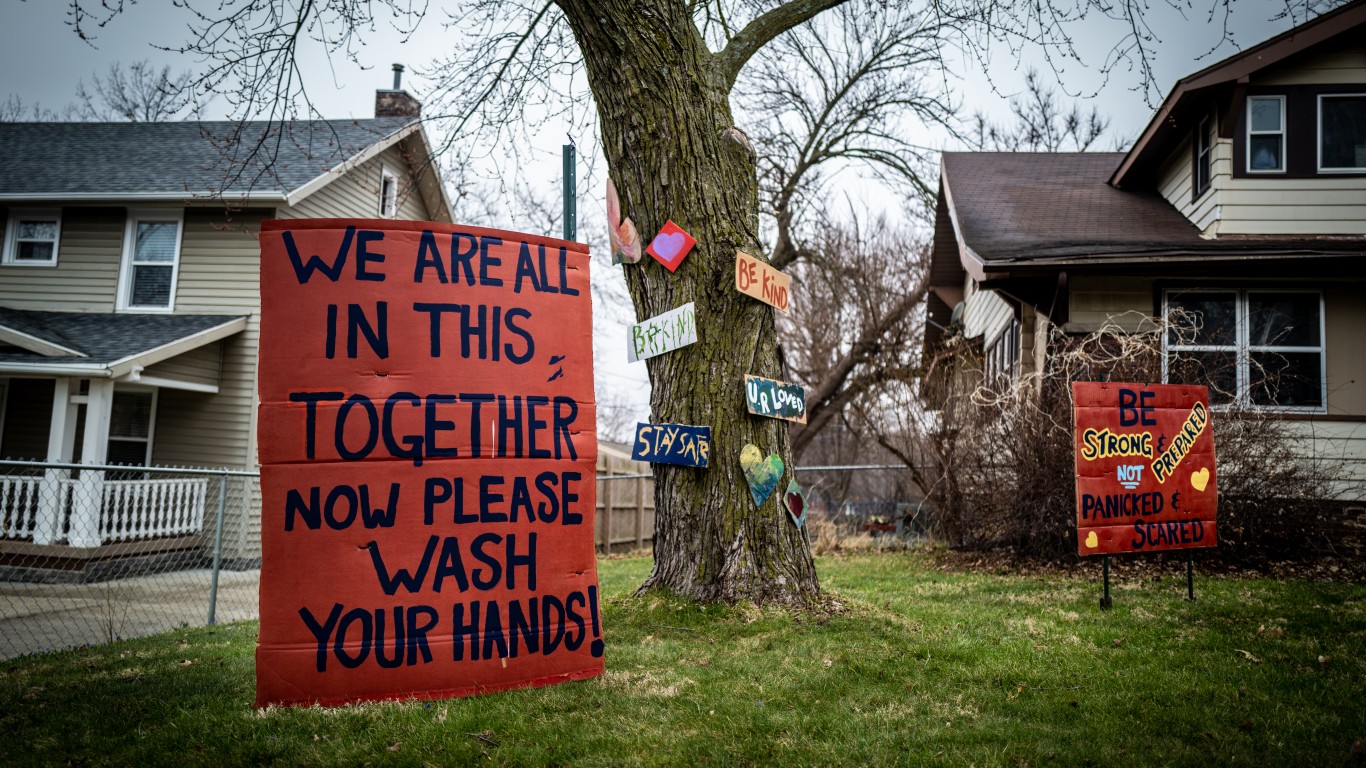
Iowa
> Confirmed COVID-19 cases as of April 24: 140.8 per 100,000 — 19th highest (total: 4,445)
> COVID-19 related deaths as of April 24: 3.4 per 100,000 — 18th lowest (total: 107)
> Tests as of April 24: 1,013.0 per 100,000 — 23rd lowest (total: 31,973)
> Days between first case on 3/8/2020 and statewide stay-at-home effective date: No order issued as of April 8
> Population: 3,156,145
There was no statewide stay-at-home order as of April 24. Nonessential businesses are closed at least until April 30. Gatherings of more than 10 people are prohibited. Large gatherings are canceled or postponed. Livestock auctions of food animals with more than 25 people and all other auctions with more than 10 people are prohibited. Anyone who refuses to limit social gatherings could face misdemeanor charges. Schools are closed through the rest of the school year.
Kansas
> Confirmed COVID-19 cases as of April 24: 85.2 per 100,000 — 14th lowest (total: 2,482)
> COVID-19 related deaths as of April 24: 3.8 per 100,000 — 23rd lowest (total: 112)
> Tests as of April 24: N/A
> Days between first case on 3/7/2020 and statewide stay-at-home effective date (3/30/2020): 23
> Population: 2,911,510
A temporary, statewide stay-home order is in effect until May 3. Residents can only go out to see a doctor, buy groceries, or care for elderly relatives. Outdoor activities are allowed, only if people maintain a distance of 6 feet from one another. Schools are closed through the rest of the school year.
[in-text-ad]
Kentucky
> Confirmed COVID-19 cases as of April 24: 77.9 per 100,000 — 12th lowest (total: 3,481)
> COVID-19 related deaths as of April 24: 4.3 per 100,000 — 24th highest (total: 191)
> Tests as of April 24: N/A
> Days between first case on 3/6/2020 and statewide stay-at-home effective date (3/26/2020): 20
> Population: 4,468,402
A healthy-at-home order is in effect until further notice. Travel from Kentucky to other states is limited. Residents can leave the state only to care for loved ones, see a doctor, go to work, if they have a court order, or to get groceries. If people leave for other reasons, they have to self-quarantine for 14 days. Phase one of the state’s gradual reopening will begin April 27, when nonessential medical services will be allowed to resume with restrictions.
Louisiana
> Confirmed COVID-19 cases as of April 24: 552.3 per 100,000 — 6th highest (total: 25,739)
> COVID-19 related deaths as of April 24: 33.0 per 100,000 — 5th highest (total: 1,540)
> Tests as of April 24: 3,044.2 per 100,000 — 3rd highest (total: 141,858)
> Days between first case on 3/9/2020 and statewide stay-at-home effective date (3/23/2020): 14
> Population: 4,659,978
An order directing all Louisiana residents to shelter at home and limit movements outside beyond essential needs is in effect until April 30. Residents can only work from home, unless they are providing essential services. Nonessential businesses are closed to the public. Banks, gas stations, and veterinary services are open. Outdoor exercise is allowed as long as people maintain 6-foot physical distancing. Playgrounds are closed.

Maine
> Confirmed COVID-19 cases as of April 24: 70.0 per 100,000 — 8th lowest (total: 937)
> COVID-19 related deaths as of April 24: 3.3 per 100,000 — 17th lowest (total: 44)
> Tests as of April 24: N/A
> Days between first case on 3/12/2020 and statewide stay-at-home effective date (4/2/2020): 21
> Population: 1,338,404
An executive order requiring travelers to the state to self quarantine for 14 days is in effect at least until April 30. All lodging businesses are suspended. Until April 30, everyone is required to stay home at all times unless for an essential job or an essential personal reason. The governor is planning a phased-in reopening.
[in-text-ad-2]
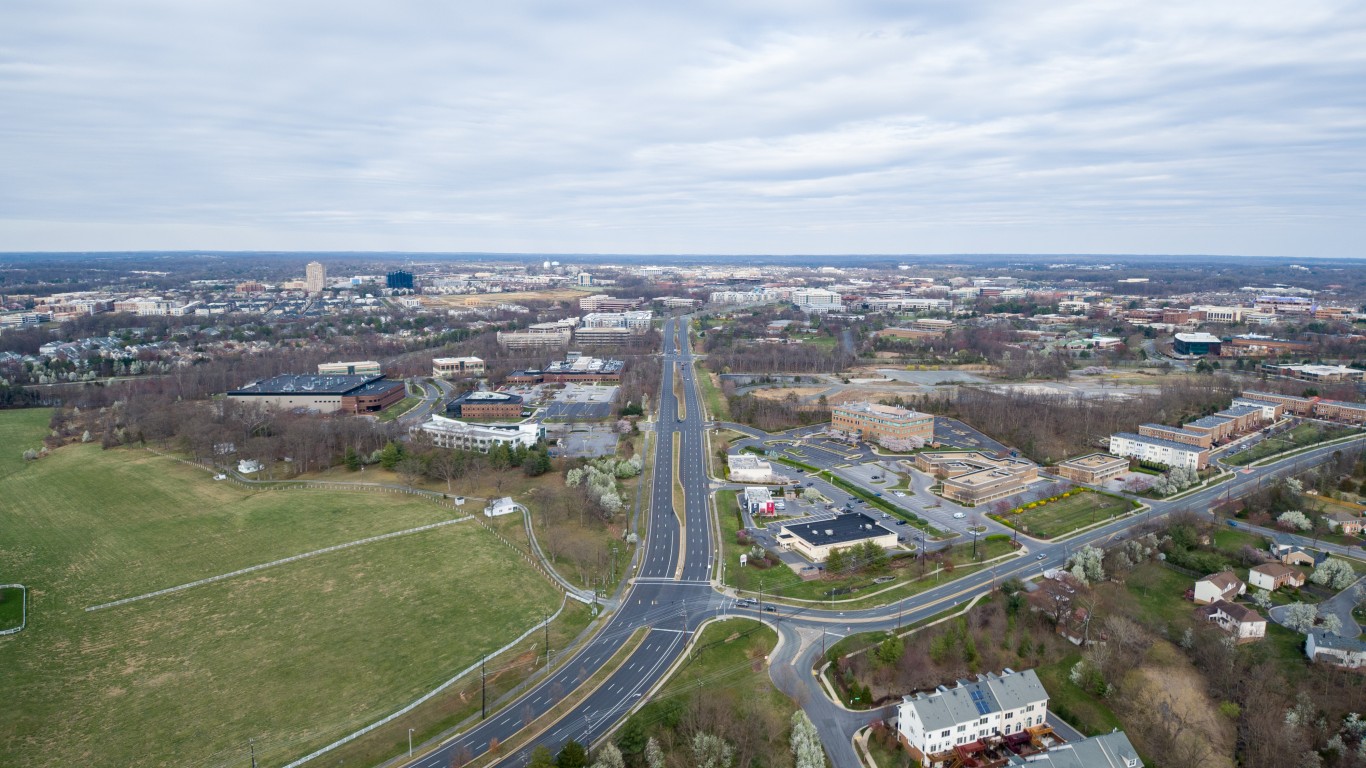
Maryland
> Confirmed COVID-19 cases as of April 24: 275.0 per 100,000 — 11th highest (total: 16,616)
> COVID-19 related deaths as of April 24: 12.0 per 100,000 — 9th highest (total: 723)
> Tests as of April 24: N/A
> Days between first case on 3/5/2020 and statewide stay-at-home effective date (3/30/2020): 25
> Population: 6,042,718
Dodging the rules can result in fines or jail time. Businesses deemed essential, including auto repair shops and certain manufacturers, can remain open. People can hunt, fish, and crab for food but follow social distancing guidelines. The stay-at-home order is in effect until terminated by the governor. An executive order is in effect to wear face coverings in any retail business or on public transportation. Schools are closed until May 15.
Massachusetts
> Confirmed COVID-19 cases as of April 24: 666.8 per 100,000 — 3rd highest (total: 46,023)
> COVID-19 related deaths as of April 24: 34.2 per 100,000 — 4th highest (total: 2,360)
> Tests as of April 24: 2,826.3 per 100,000 — 4th highest (total: 195,076)
> Days between first case on 2/1/2020 and statewide stay-at-home effective date (3/24/2020): 52
> Population: 6,902,149
The stay-at-home order and an order for nonessential businesses and organizations with in-person operations to remain closed have been extended until May 4. Gatherings of more than 10 people are prohibited. Medical marijuana shops are still open, but recreational marijuana shops are closed. Schools are closed through the rest of the school year, and day care centers are closed until the end of June.
[in-text-ad]
Michigan
> Confirmed COVID-19 cases as of April 24: 353.1 per 100,000 — 7th highest (total: 35,291)
> COVID-19 related deaths as of April 24: 29.8 per 100,000 — 6th highest (total: 2,977)
> Tests as of April 24: N/A
> Days between first case on 3/10/2020 and statewide stay-at-home effective date (3/24/2020): 14
> Population: 9,995,915
Residents can be criminally penalized for breaking social distancing rules. The stay-at-home order has been extended and is in effect at least until May 15. Restrictions on activities such as boating and golfing have been eased. Big retailers are now allowed to resume selling non-essential items in stores.
Minnesota
> Confirmed COVID-19 cases as of April 24: 56.8 per 100,000 — 6th lowest (total: 3,185)
> COVID-19 related deaths as of April 24: 3.9 per 100,000 — 25th lowest (total: 221)
> Tests as of April 24: 958.6 per 100,000 — 20th lowest (total: 53,787)
> Days between first case on 3/6/2020 and statewide stay-at-home effective date (3/27/2020): 21
> Population: 5,611,179
The stay-at-home order was extended until May 4. People can still leave their homes to pick up essential items such as groceries or food, prescriptions, and gas, to relocate for safety reasons, or go to work if their job is deemed essential. Schools are closed for the rest of the school year. Some recreational activities, including golfing, boating, fishing, hunting and hiking have been allowed to resume after April 18.
Mississippi
> Confirmed COVID-19 cases as of April 24: 182.0 per 100,000 — 16th highest (total: 5,434)
> COVID-19 related deaths as of April 24: 7.0 per 100,000 — 17th highest (total: 209)
> Tests as of April 24: 1,854.6 per 100,000 — 12th highest (total: 55,389)
> Days between first case on 3/11/2020 and statewide stay-at-home effective date (4/3/2020): 23
> Population: 2,986,530
A shelter-in-place order is in effect until April 27. If people go out, they have to stay 6 feet away from each other and can’t gather in groups of more than 10 people. All nonessential businesses are closed. All places of amusement and recreation are closed. Gov. Tate Reeves (R) has said he plans to begin allowing businesses — though he did not specify which — to reopen next week.
[in-text-ad-2]
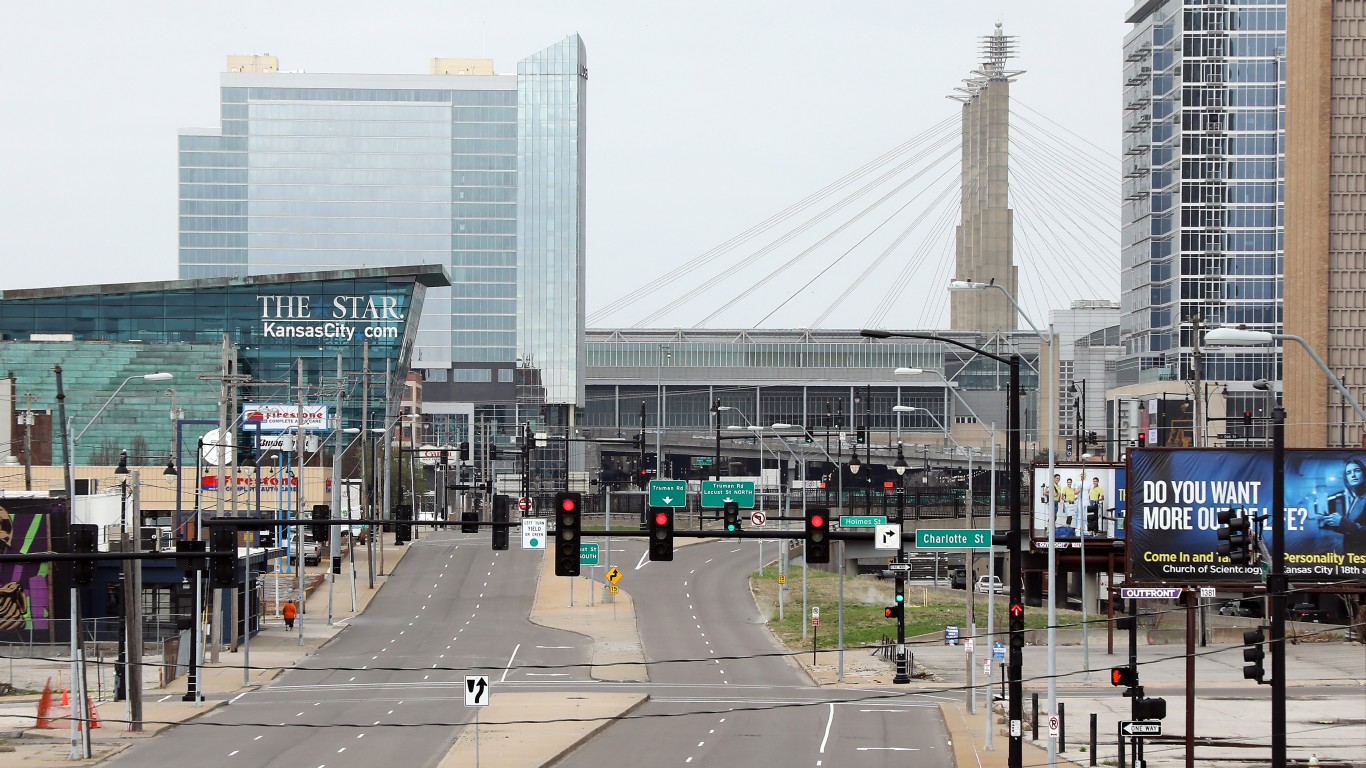
Missouri
> Confirmed COVID-19 cases as of April 24: 103.2 per 100,000 — 20th lowest (total: 6,321)
> COVID-19 related deaths as of April 24: 3.6 per 100,000 — 20th lowest (total: 218)
> Tests as of April 24: 1,059.4 per 100,000 — 25th highest (total: 64,903)
> Days between first case on 3/7/2020 and statewide stay-at-home effective date (4/6/2020): 30
> Population: 6,126,452
A stay-at-home order is in effect until May 3. People can still access essential services, such as grocery stores, gas stations, and banks, or engage in outdoor recreation, but they have to stay at least 6 feet away from one another. All state office buildings are closed to the public; however, essential state functions continue. Takeout food orders are still allowed, and playgrounds are also open. Schools are closed through the rest of the school year.
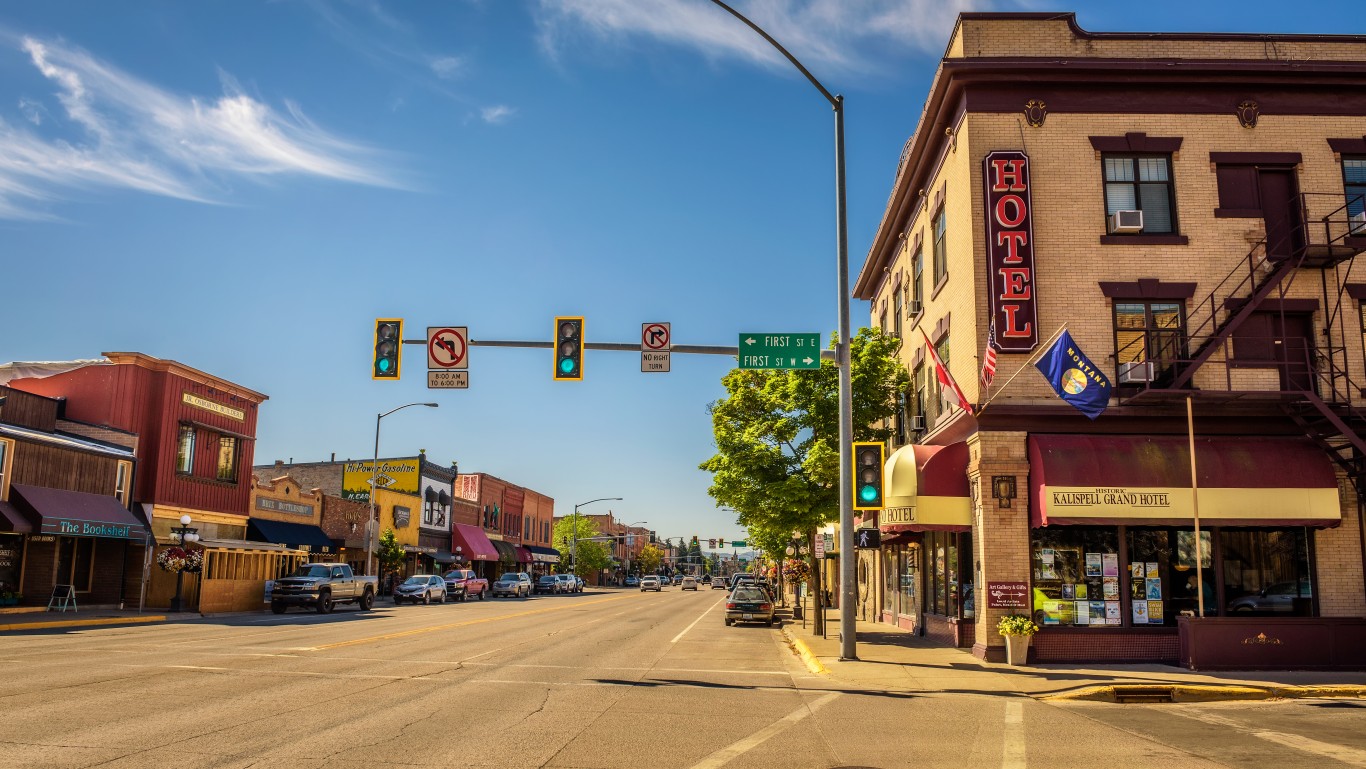
Montana
> Confirmed COVID-19 cases as of April 24: 41.8 per 100,000 — the lowest (total: 444)
> COVID-19 related deaths as of April 24: 1.3 per 100,000 — 6th lowest (total: 14)
> Tests as of April 24: 1,141.6 per 100,000 — 21st highest (total: 12,127)
> Days between first case on 3/13/2020 and statewide stay-at-home effective date (3/28/2020): 15
> Population: 1,062,305
A shelter-in-place order is in effect at least until April 26 for individuals and April 27 for businesses. Phased opening is set to begin April 27. Churches will be allowed to reopen with social distancing measures in place. Schools are allowed to reopen May 7, along with restaurants at reduced capacity.
[in-text-ad]
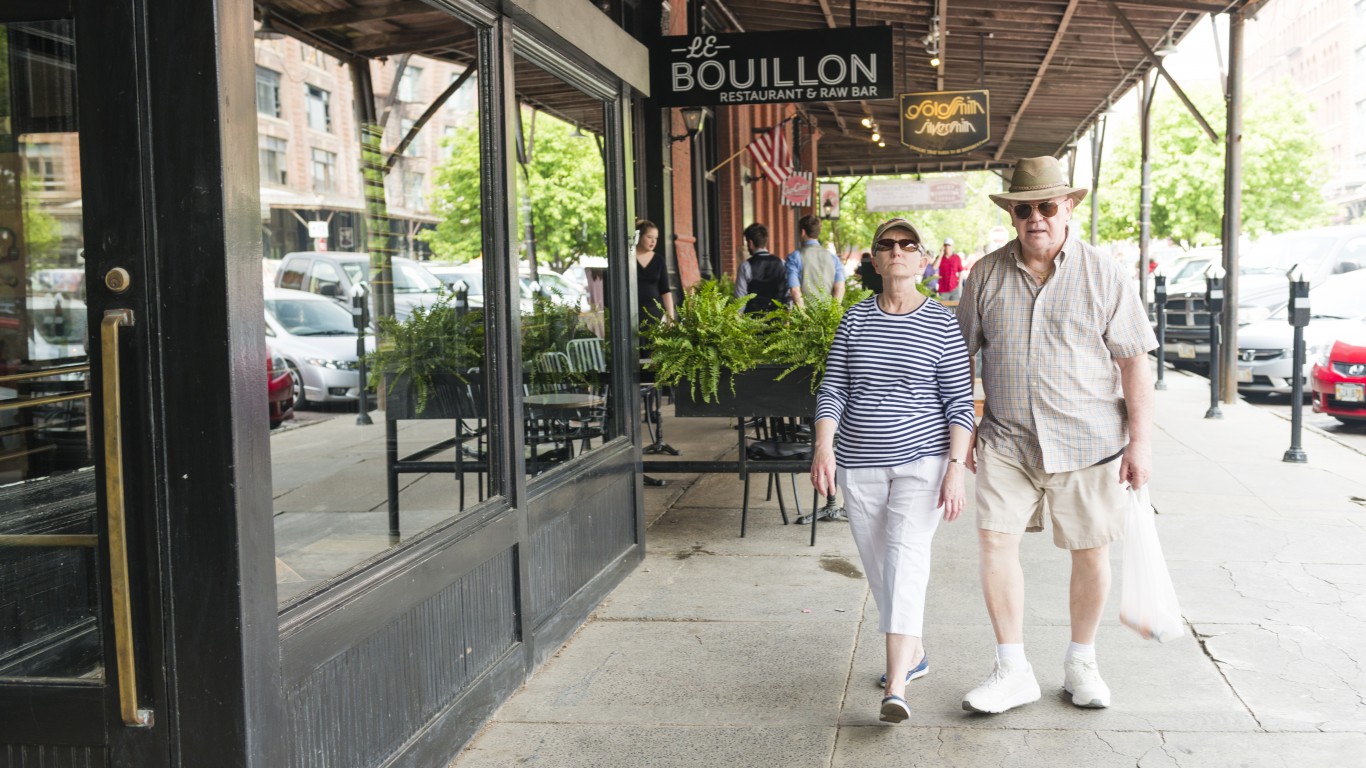
Nebraska
> Confirmed COVID-19 cases as of April 24: 110.1 per 100,000 — 22nd lowest (total: 2,124)
> COVID-19 related deaths as of April 24: 2.4 per 100,000 — 12th lowest (total: 47)
> Tests as of April 24: 969.3 per 100,000 — 22nd lowest (total: 18,701)
> Days between first case on 2/17/2020 and statewide stay-at-home effective date: No order issued as of April 8
> Population: 1,929,268
There was no statewide stay-at-home order as of April 24. Schools are closed through the rest of the school year. Statewide social distancing restrictions are in effect through April 30. Gatherings of more than 10 people are prohibited. Child care centers are open but they have to follow the 10-person guidance. Restaurants and bars must limit to 10 people, but they are strongly encouraged to move to drive-thru / takeout only through the end of April.

Nevada
> Confirmed COVID-19 cases as of April 24: 138.7 per 100,000 — 20th highest (total: 4,208)
> COVID-19 related deaths as of April 24: 6.4 per 100,000 — 18th highest (total: 195)
> Tests as of April 24: 1,145.2 per 100,000 — 20th highest (total: 34,749)
> Days between first case on 3/5/2020 and statewide stay-at-home effective date (4/1/2020): 27
> Population: 3,034,392
A stay-at-home order, which also extends to closure of nonessential businesses, gaming, and schools, is in effect through April 30. Nevadans must not leave their homes for nonessential activities. Nonessential businesses are closed, and bans on public gatherings of 10 or more people are in effect. Outdoor exercise is allowed as long as people maintain 6-foot physical distancing. There are no specific dates for loosening restrictions.

New Hampshire
> Confirmed COVID-19 cases as of April 24: 123.1 per 100,000 — 24th highest (total: 1,670)
> COVID-19 related deaths as of April 24: 3.8 per 100,000 — 22nd lowest (total: 51)
> Tests as of April 24: N/A
> Days between first case on 3/2/2020 and statewide stay-at-home effective date (3/27/2020): 25
> Population: 1,356,458
Until May 4, residents must stay at home or in their place of residence except for essential needs and only provided that social distancing protocols are observed. Schools are closed in the state for the rest of the school year. There is a temporary ban on scheduled gatherings of 10 or more attendees. All state beaches along the Seacoast are closed.
[in-text-ad-2]

New Jersey
> Confirmed COVID-19 cases as of April 24: 1,122.4 per 100,000 — 2nd highest (total: 99,989)
> COVID-19 related deaths as of April 24: 60.3 per 100,000 — 2nd highest (total: 5,368)
> Tests as of April 24: 2,017.4 per 100,000 — 10th highest (total: 179,717)
> Days between first case on 3/4/2020 and statewide stay-at-home effective date (3/21/2020): 17
> Population: 8,908,520
Nonessential businesses, including casinos, are closed. A stay-at-home order is in effect until further notice. Schools in the state are closed until May 15. Child care centers are closed except for children of essential workers. Restaurants and bars are closed except for takeout and delivery. Grocery stores, medical marijuana dispensaries, gas stations, and convenience stores are among the retail businesses that can stay open. State and county parks are closed.

New Mexico
> Confirmed COVID-19 cases as of April 24: 113.5 per 100,000 — 23rd lowest (total: 2,379)
> COVID-19 related deaths as of April 24: 3.7 per 100,000 — 21st lowest (total: 78)
> Tests as of April 24: 2,222.1 per 100,000 — 8th highest (total: 46,563)
> Days between first case on 3/11/2020 and statewide stay-at-home effective date (3/24/2020): 13
> Population: 2,095,428
The stay-at-home order is in effect through May 15 at least. Getting outdoors is allowed if social distancing rules are followed. State parks remain closed. People traveling to NM must self-isolate. Schools are closed throughout the remainder of the school year.
[in-text-ad]
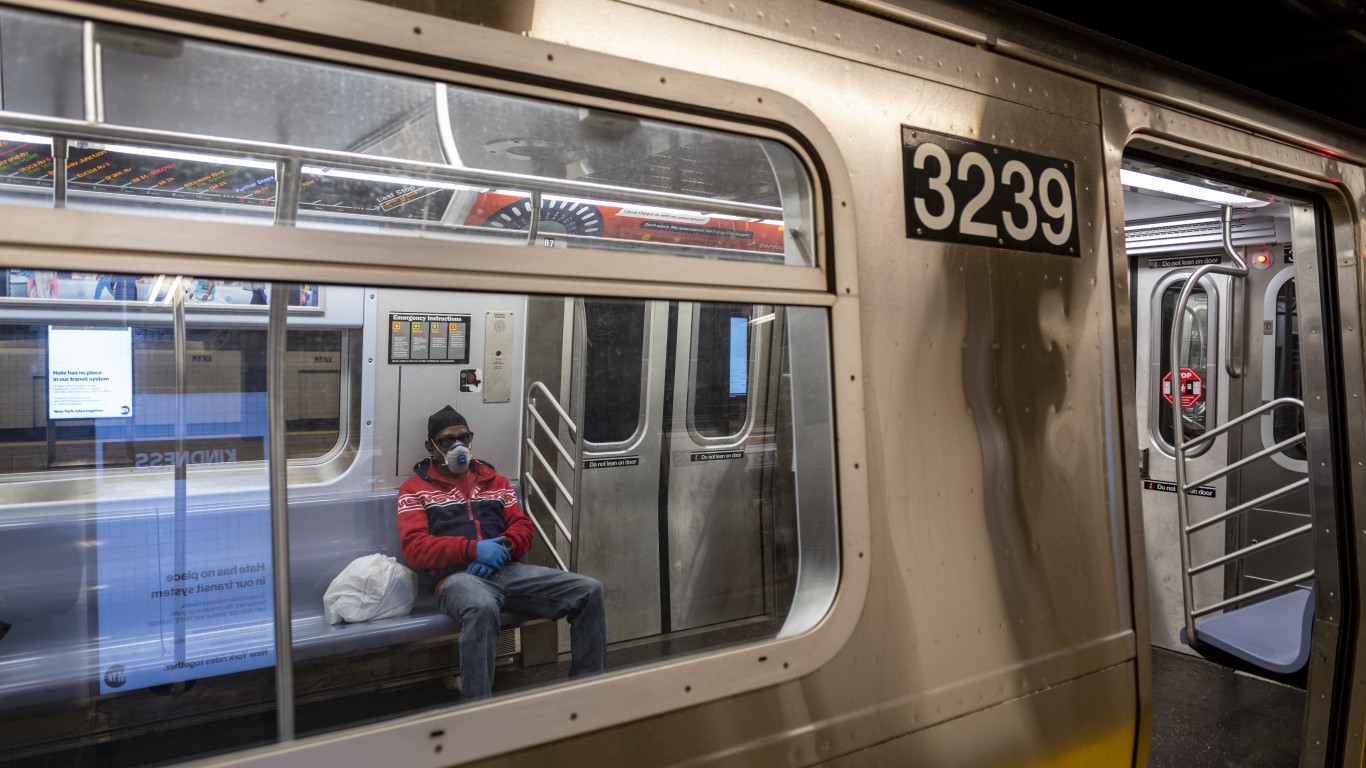
New York
> Confirmed COVID-19 cases as of April 24: 1,348.2 per 100,000 — the highest (total: 263,460)
> COVID-19 related deaths as of April 24: 80.5 per 100,000 — the highest (total: 15,740)
> Tests as of April 24: 3,561.1 per 100,000 — 2nd highest (total: 695,920)
> Days between first case on 3/1/2020 and statewide stay-at-home effective date (3/22/2020): 21
> Population: 19,542,209
The stay-at-home order is in effect until May 15. Fines for breaking social distancing measures were raised to $1,000. Residents must stay at home except to get essential services, and even then they must stay at least 6 feet apart. All nonessential businesses are closed. Schools are closed at least until May 15, while schools in New York City are closed throughout the rest of the school year. Restaurants can only serve food or beverage for off-premises consumption until further notice.
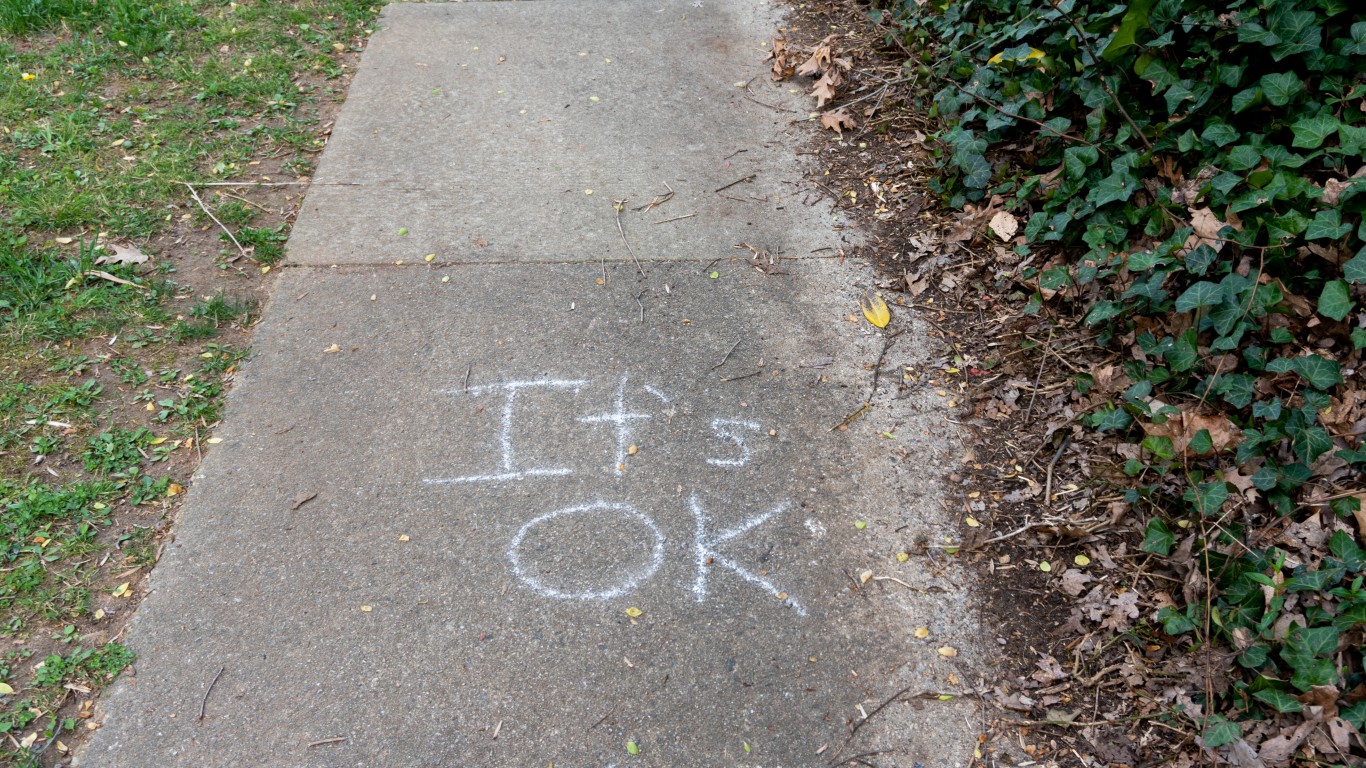
North Carolina
> Confirmed COVID-19 cases as of April 24: 77.5 per 100,000 — 11th lowest (total: 8,052)
> COVID-19 related deaths as of April 24: 2.6 per 100,000 — 14th lowest (total: 269)
> Tests as of April 24: 968.7 per 100,000 — 21st lowest (total: 100,584)
> Days between first case on 3/3/2020 and statewide stay-at-home effective date (3/30/2020): 27
> Population: 10,383,620
The stay-at-home order, which also prevents gatherings of more than 10 people, is in effect until at least May 8. It is not clear how long the ban on in-person dining at restaurants would be in effect. Public schools are closed through May 15.

North Dakota
> Confirmed COVID-19 cases as of April 24: 98.4 per 100,000 — 18th lowest (total: 748)
> COVID-19 related deaths as of April 24: 2.0 per 100,000 — 10th lowest (total: 15)
> Tests as of April 24: 2,295.7 per 100,000 — 6th highest (total: 17,449)
> Days between first case on 3/11/2020 and statewide stay-at-home effective date: No order issued as of April 8
> Population: 760,077
There was no statewide stay-at-home order as of April 24. However, visitations to long-term care facilities are suspended, and all nonessential businesses are closed at least until April 30. Schools are closed until further notices, but some facilities will be allowed to reopen in May. Some businesses will be allowed to open, but safety measures such as daily disinfection and limits on the number of customers will be in effect.
[in-text-ad-2]
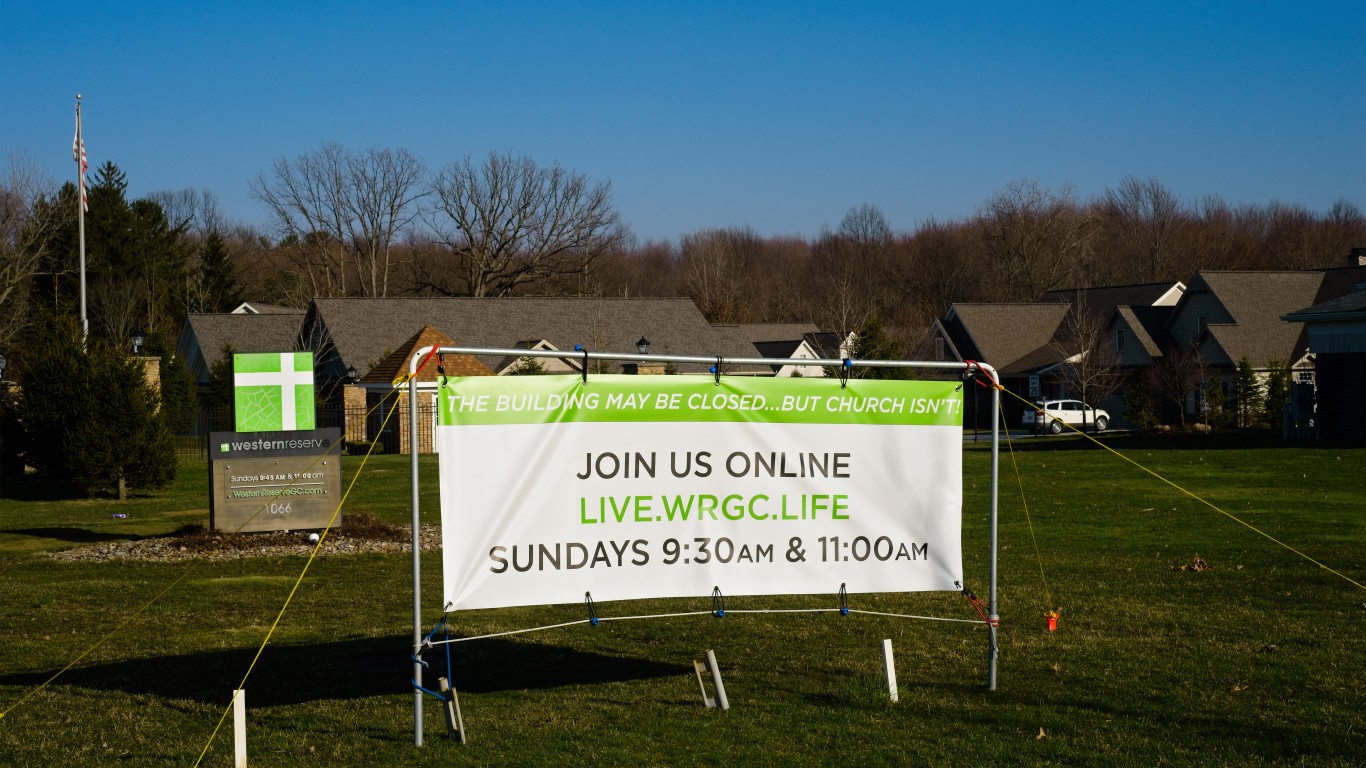
Ohio
> Confirmed COVID-19 cases as of April 24: 125.7 per 100,000 — 23rd highest (total: 14,694)
> COVID-19 related deaths as of April 24: 5.6 per 100,000 — 19th highest (total: 656)
> Tests as of April 24: N/A
> Days between first case on 3/9/2020 and statewide stay-at-home effective date (3/23/2020): 14
> Population: 11,689,442
Residents, with few exceptions, are ordered to stay at home at least until May 1. After that, the state will begin to reopen in a phased-in approach. People can leave their homes only for essential activities or if they are part of an essential business. Gatherings of more than 10 people are banned. Only essential travel is allowed. Playgrounds are closed, but parks are open. Child day care centers are open but are required to obtain and operate under a temporary pandemic license, with a maximum of six children allowed per room.

Oklahoma
> Confirmed COVID-19 cases as of April 24: 76.5 per 100,000 — 10th lowest (total: 3,017)
> COVID-19 related deaths as of April 24: 4.5 per 100,000 — 21st highest (total: 179)
> Tests as of April 24: N/A
> Days between first case on 3/6/2020 and statewide stay-at-home effective date: No order issued as of April 8
> Population: 3,943,079
There was no statewide stay-at-home order has been issued as of April 24 except for older people and those who have severe preexisting conditions. They have to stay home at least until May 6. Tulsa, Oklahoma City, and Norman have issued stay-at-home orders. Previously suspended elective surgeries can reopen on April 24. Schools are closed for the rest of the academic year.
[in-text-ad]
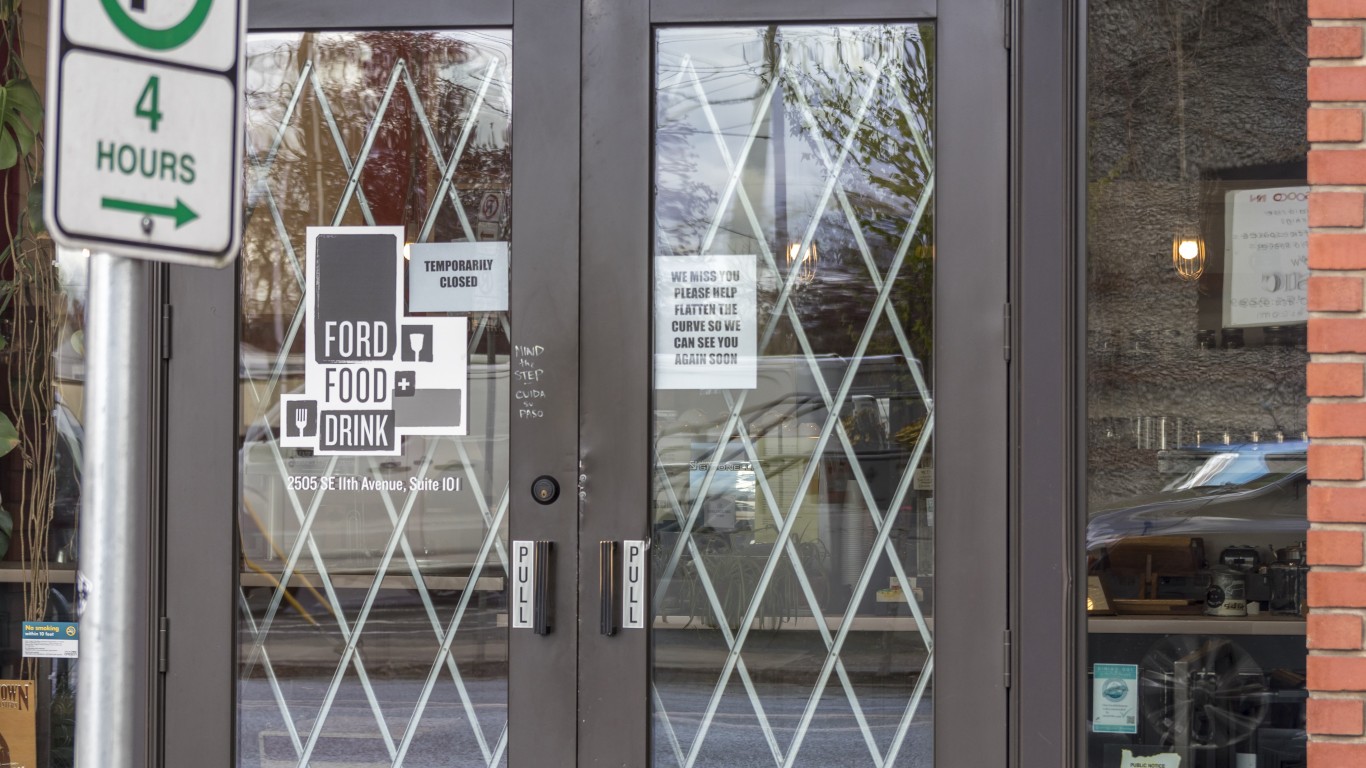
Oregon
> Confirmed COVID-19 cases as of April 24: 50.8 per 100,000 — 4th lowest (total: 2,127)
> COVID-19 related deaths as of April 24: 2.0 per 100,000 — 11th lowest (total: 83)
> Tests as of April 24: 1,049.4 per 100,000 — 25th lowest (total: 43,976)
> Days between first case on 2/28/2020 and statewide stay-at-home effective date (3/23/2020): 24
> Population: 4,190,713
A stay-at-home order is in effect until further notice. Gatherings of more than 25 people are banned. Nonessential social and recreational gatherings are allowed if people keep a distance of at least 6 feet. People violating the order are subject to penalties. All pools, skate parks, outdoor courts, and playgrounds are closed. Non-urgent medical procedures can restart on May 1. Schools are closed for the rest of the school year
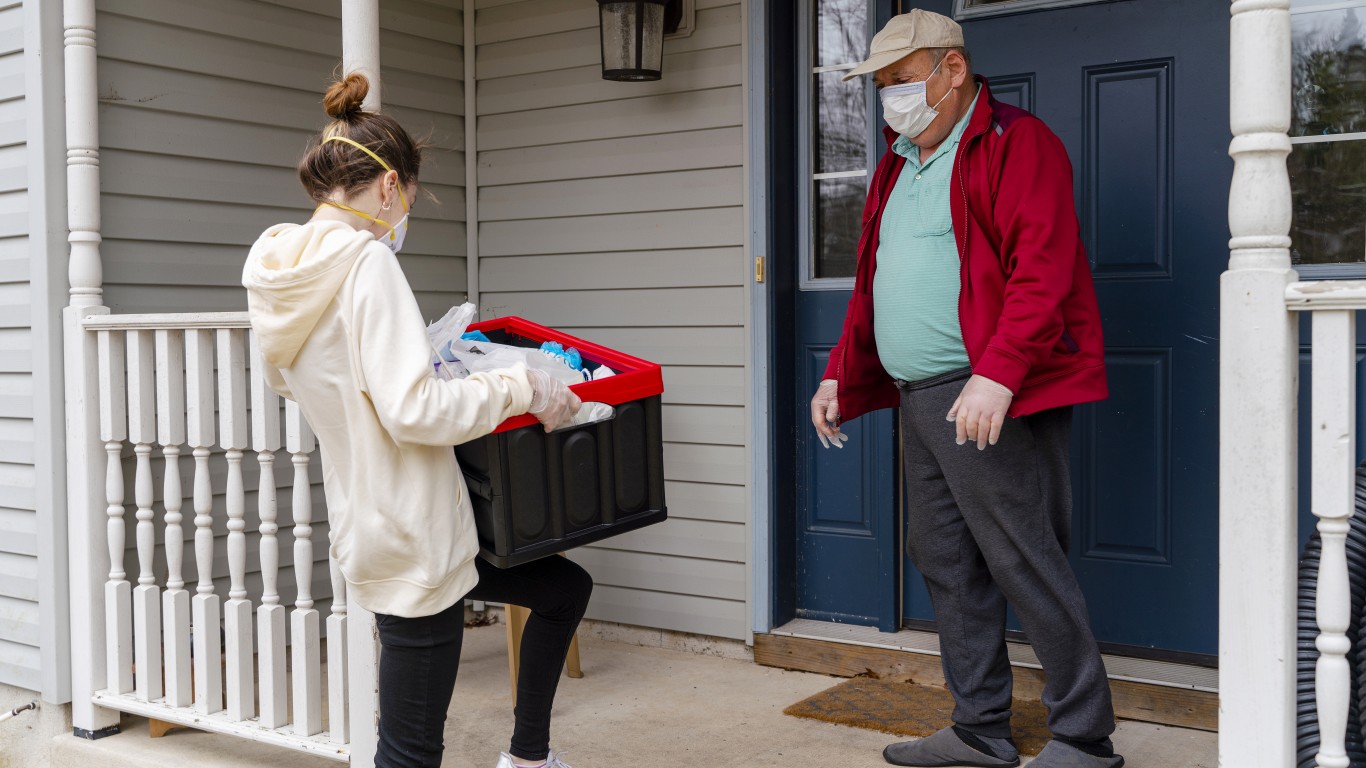
Pennsylvania
> Confirmed COVID-19 cases as of April 24: 301.8 per 100,000 — 9th highest (total: 38,652)
> COVID-19 related deaths as of April 24: 11.6 per 100,000 — 10th highest (total: 1,492)
> Tests as of April 24: N/A
> Days between first case on 3/6/2020 and statewide stay-at-home effective date (4/1/2020): 26
> Population: 12,807,060
A stay-at-home order in effect until May 8. Restrictions on construction, curbside alcohol pickup, and vehicle sales may be eased after that. Trout fishing season is open as long as people follow social distancing guidelines. Only life-sustaining businesses may remain open. Outdoor exercise is allowed as long as people maintain 6-foot physical distancing.
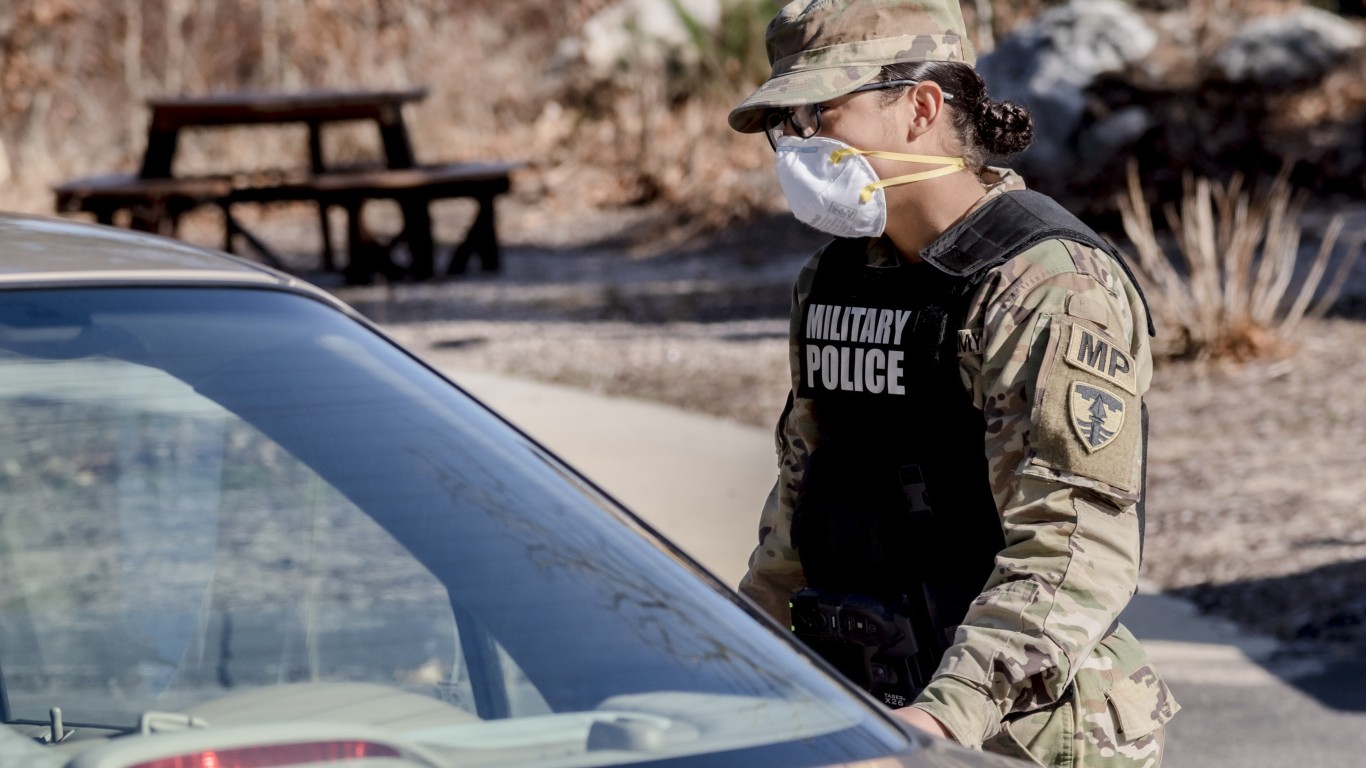
Rhode Island
> Confirmed COVID-19 cases as of April 24: 633.6 per 100,000 — 5th highest (total: 6,699)
> COVID-19 related deaths as of April 24: 19.1 per 100,000 — 7th highest (total: 202)
> Tests as of April 24: 4,469.5 per 100,000 — the highest (total: 47,257)
> Days between first case on 3/1/2020 and statewide stay-at-home effective date (3/28/2020): 27
> Population: 1,057,315
The stay-at-home order was extended until May 8. Quarantine restrictions on people returning to Rhode Island from other states and those returning by air are in place. People can go out to go to work, for medical treatment, or obtain necessities. Gatherings of more than five people are banned. All noncritical retail businesses are closed. Schools are closed for the rest of the school year.
[in-text-ad-2]
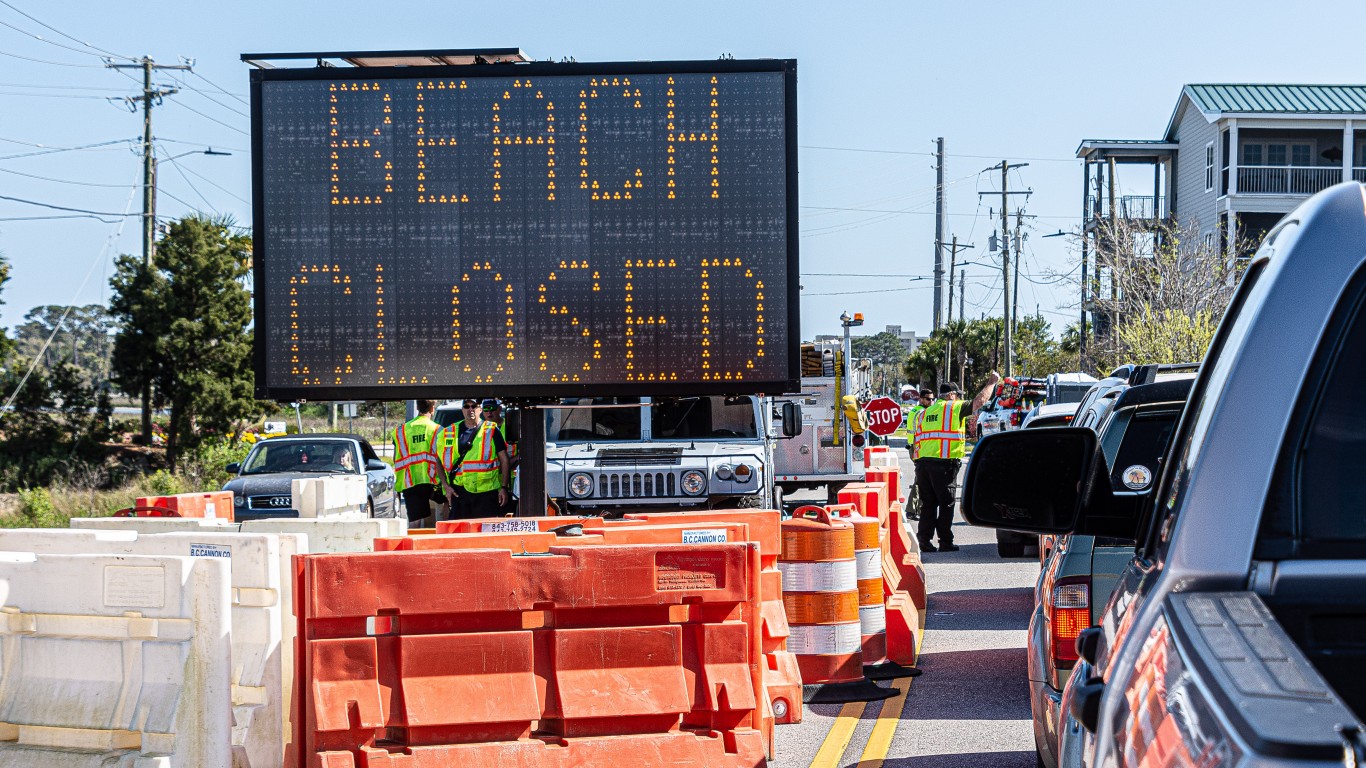
South Carolina
> Confirmed COVID-19 cases as of April 24: 96.7 per 100,000 — 17th lowest (total: 4,917)
> COVID-19 related deaths as of April 24: 3.0 per 100,000 — 15th lowest (total: 150)
> Tests as of April 24: 874.5 per 100,000 — 18th lowest (total: 44,463)
> Days between first case on 3/6/2020 and statewide stay-at-home effective date (4/6/2020): 31
> Population: 5,084,127
The stay-at-home will last as long as the state is under a state of emergency. People can leave for obtaining necessary supplies, obtaining essential services, attending religious services, or exercising. All public transportation drivers are to keep a distance of 6 feet from any passenger. Anyone out and not performing essential duties is subject to a misdemeanor criminal charge, punishable by up to 30 days in jail. Public beaches can remain open, though many have not.
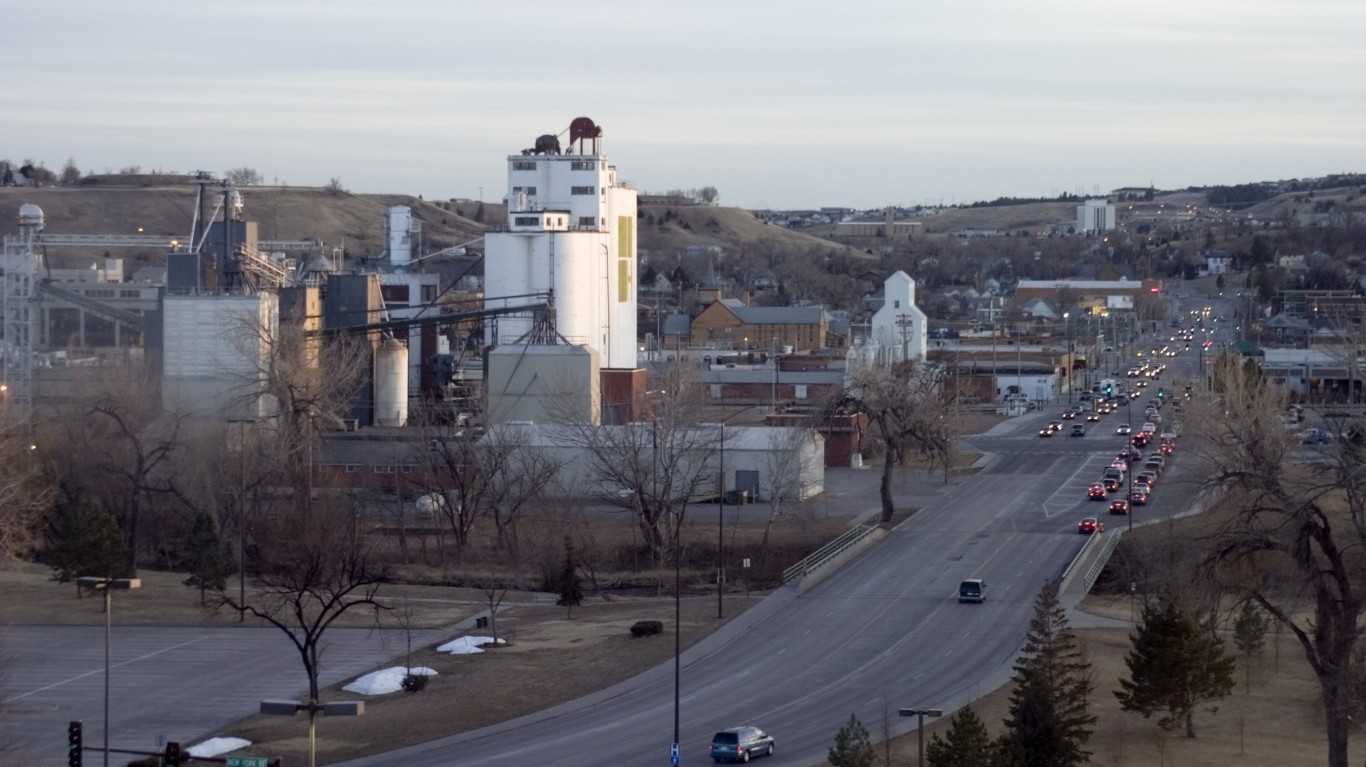
South Dakota
> Confirmed COVID-19 cases as of April 24: 210.6 per 100,000 — 12th highest (total: 1,858)
> COVID-19 related deaths as of April 24: 1.0 per 100,000 — 2nd lowest (total: 09)
> Tests as of April 24: 1,524.1 per 100,000 — 16th highest (total: 13,446)
> Days between first case on 3/10/2020 and statewide stay-at-home effective date: No order issued as of April 8
> Population: 882,235
There was no official stay-at-home order as of April 24. People are encouraged to stay at home and not gather in groups of 10 or more. Any enclosed businesses should offer alternative services to comply with CDC guidance. When outside, people must be at least 6 feet apart. All businesses are encouraged to suspend daily business in the interest of public safety. Schools are closed in the state through the rest of the year.
[in-text-ad]
Tennessee
> Confirmed COVID-19 cases as of April 24: 122.1 per 100,000 — 25th highest (total: 8,266)
> COVID-19 related deaths as of April 24: 2.5 per 100,000 — 13th lowest (total: 170)
> Tests as of April 24: 1,818.3 per 100,000 — 13th highest (total: 123,100)
> Days between first case on 3/5/2020 and statewide stay-at-home effective date (3/31/2020): 26
> Population: 6,770,010
Residents are required to stay home unless they are carrying out essential activities. The order is in effect until April 30. Many businesses will be allowed to open after that. State parks will start reopening starting April 24. Restaurants are allowed to open for dine-in service with reduced capacity.

Texas
> Confirmed COVID-19 cases as of April 24: 76.5 per 100,000 — 9th lowest (total: 21,944)
> COVID-19 related deaths as of April 24: 2.0 per 100,000 — 9th lowest (total: 561)
> Tests as of April 24: 784.2 per 100,000 — 16th lowest (total: 225,078)
> Days between first case on 2/12/2020 and statewide stay-at-home effective date (4/2/2020): 50
> Population: 28,701,845
The stay-at-home order is in effect until April 30 with exceptions for essential activities like going to the grocery store, pharmacy, or bank, and for working at a business that provides an essential service. Hunting, fishing, or exercising outside are still permitted as long as social distancing measures are taken. Restaurants may be open for takeout, delivery, or drive-thru. State parks started reopening on April 20, and some stores can start offering “retail to go” on April 24. Face coverings are still required. State schools will remain closed for the rest of the school year.
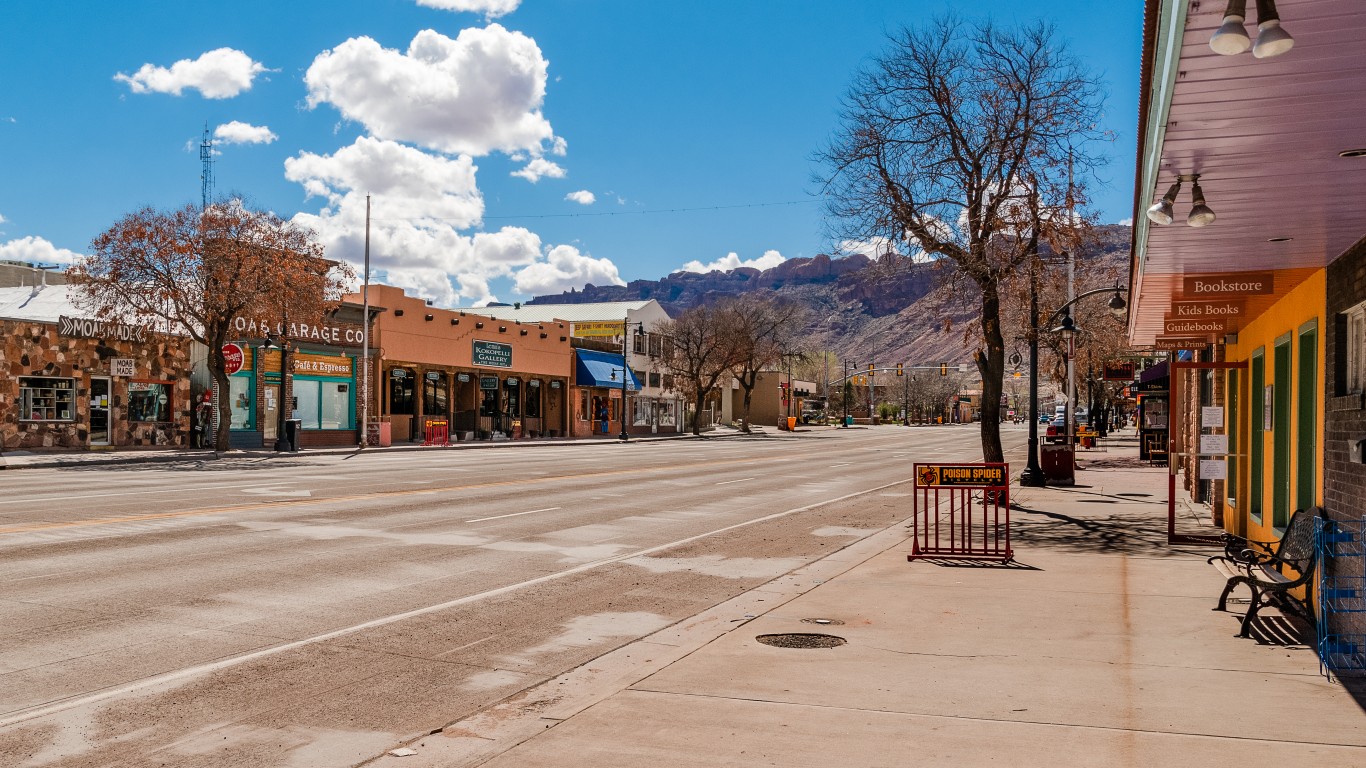
Utah
> Confirmed COVID-19 cases as of April 24: 114.3 per 100,000 — 24th lowest (total: 3,612)
> COVID-19 related deaths as of April 24: 1.1 per 100,000 — 3rd lowest (total: 35)
> Tests as of April 24: 2,550.6 per 100,000 — 5th highest (total: 80,627)
> Days between first case on 2/25/2020 and statewide stay-at-home effective date: No order issued as of April 8
> Population: 3,161,105
There was no statewide stay-at-home order as of April 24, but several counties did issue one, including Salt Lake County. Diners and eateries can now allow customers inside to pick up orders — as long as they stay 6 feet away from each other. Some counties’ health orders remain more restrictive than the state’s. Statewide restrictions on elective surgeries and procedures were lifted as of April 21.
[in-text-ad-2]

Vermont
> Confirmed COVID-19 cases as of April 24: 132.0 per 100,000 — 21st highest (total: 827)
> COVID-19 related deaths as of April 24: 7.0 per 100,000 — 16th highest (total: 44)
> Tests as of April 24: 2,284.9 per 100,000 — 7th highest (total: 14,310)
> Days between first case on 3/7/2020 and statewide stay-at-home effective date (3/24/2020): 17
> Population: 626,299
The stay-at-home order in effect until at least May 15. Schools are closed through the rest of the academic year. Residents can only leave their homes for essential reasons such as personal safety, groceries or medicine, curbside pickup of goods, and a few others. Everyone has to work remotely when possible. Some “low contact” businesses can open after April 20 with a two-person staff.
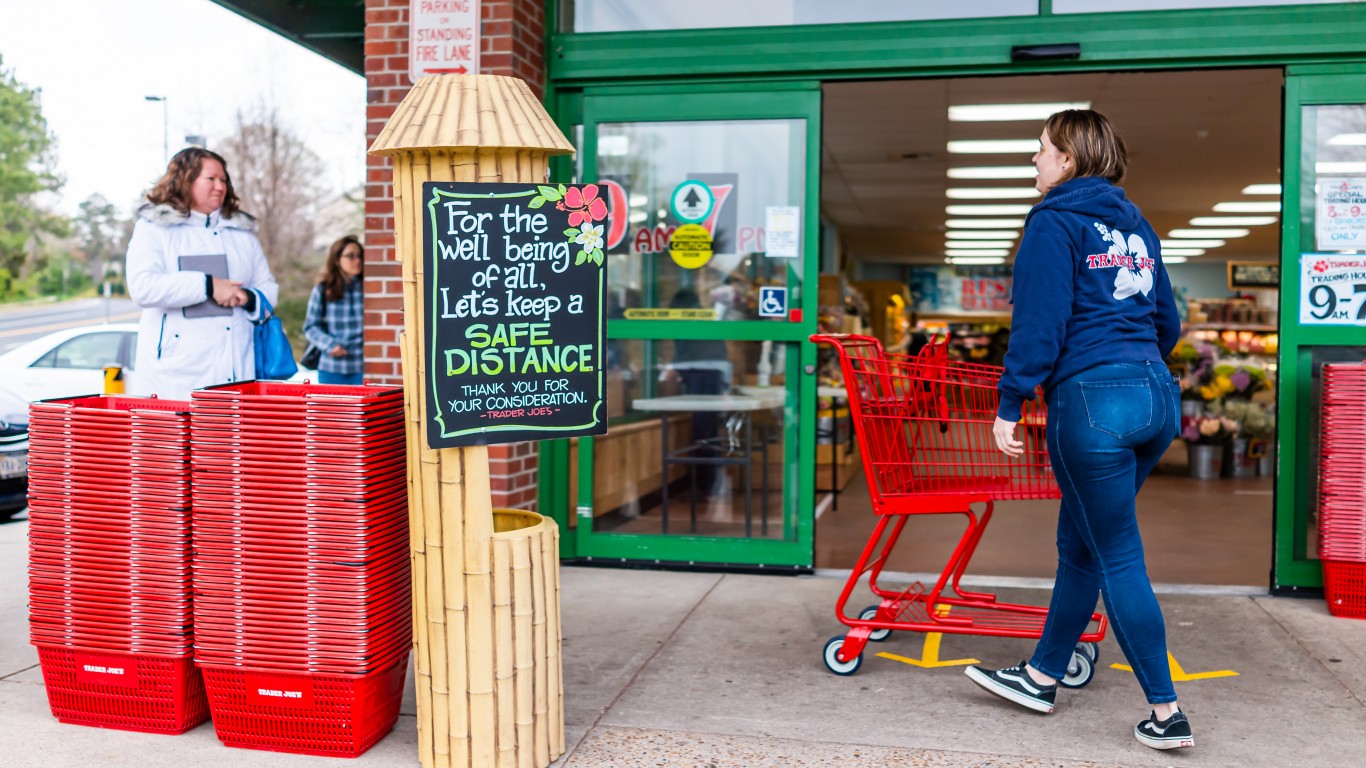
Virginia
> Confirmed COVID-19 cases as of April 24: 129.1 per 100,000 — 22nd highest (total: 10,998)
> COVID-19 related deaths as of April 24: 4.4 per 100,000 — 23rd highest (total: 372)
> Tests as of April 24: 757.5 per 100,000 — 15th lowest (total: 64,518)
> Days between first case on 3/7/2020 and statewide stay-at-home effective date (3/30/2020): 23
> Population: 8,517,685
The stay-at-home order is in effect until June 10. It is unlawful to gather in groups of 10 or more people. Those violating social distancing rules can be charged with a misdemeanor, which carries the possibility of jail time up to 12 months and a fine of up to $2,500. Essential businesses are closed at least until May 8. Beaches are closed statewide except for fishing and exercise. All K-12 schools are closed through the rest of the school year.
[in-text-ad]
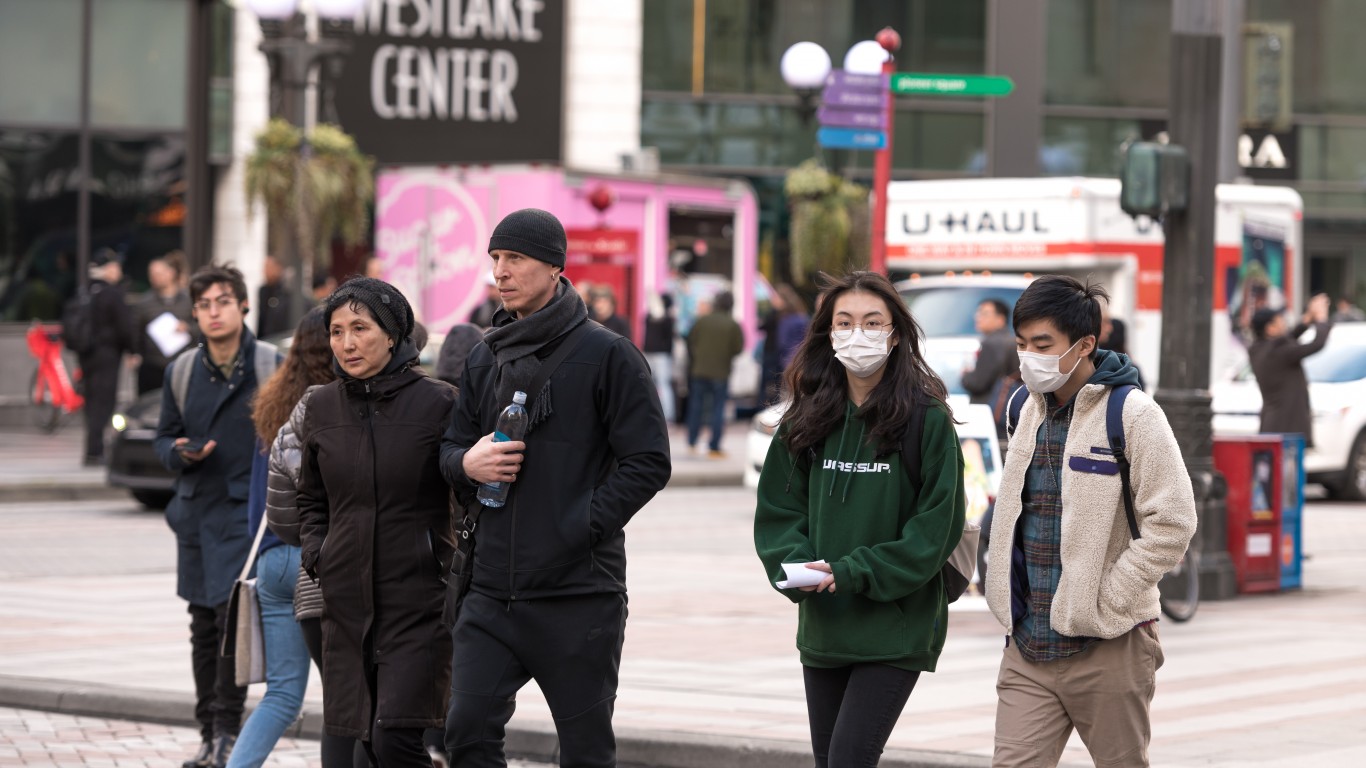
Washington
> Confirmed COVID-19 cases as of April 24: 169.2 per 100,000 — 17th highest (total: 12,753)
> COVID-19 related deaths as of April 24: 9.4 per 100,000 — 14th highest (total: 711)
> Tests as of April 24: 2,035.4 per 100,000 — 9th highest (total: 153,376)
> Days between first case on 1/21/2020 and statewide stay-at-home effective date (3/23/2020): 62
> Population: 7,535,591
The stay-at-home order in effect until May 4. All gatherings for social, spiritual, and recreational purposes are banned. Only essential businesses are allowed to remain open. People can still go on bike rides, garden, and walk the dogs as long as they follow social distancing rules. Sports courts and playgrounds are closed. All K-12 schools are closed for the rest of the school year.

West Virginia
> Confirmed COVID-19 cases as of April 24: 54.3 per 100,000 — 5th lowest (total: 981)
> COVID-19 related deaths as of April 24: 1.7 per 100,000 — 8th lowest (total: 31)
> Tests as of April 24: 1,612.3 per 100,000 — 14th highest (total: 29,116)
> Days between first case on 3/17/2020 and statewide stay-at-home effective date (3/24/2020): 7
> Population: 1,805,832
A stay-at-home order is in effect until further notice. Out-of-state citizens must self-quarantine for 14 days. State park campgrounds are closed. If people fail to comply, they may be fined up to $500 or imprisoned for up to a year. Elective medical procedures will resume April 28. Nonessential businesses are closed at least until April 30. Schools are closed through the rest of the school year.
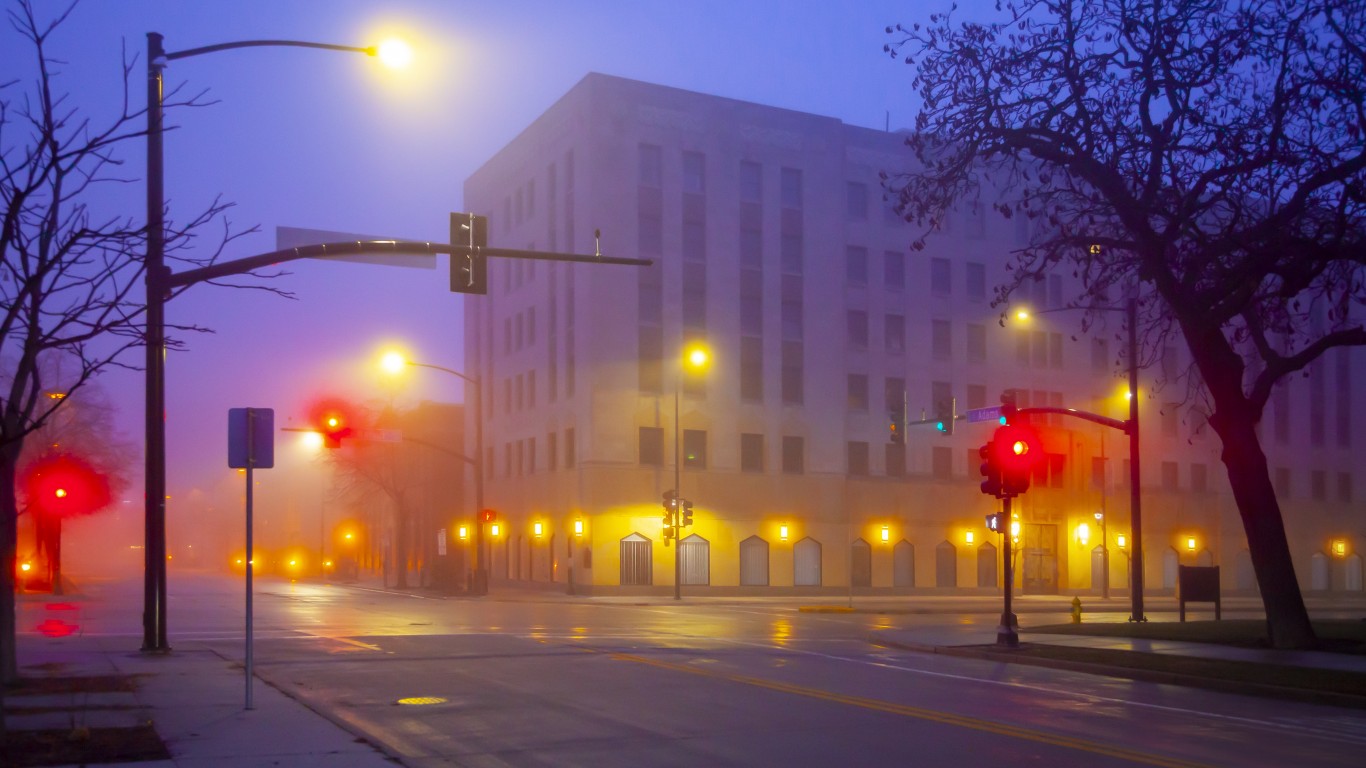
Wisconsin
> Confirmed COVID-19 cases as of April 24: 86.9 per 100,000 — 16th lowest (total: 5,052)
> COVID-19 related deaths as of April 24: 4.4 per 100,000 — 22nd highest (total: 257)
> Tests as of April 24: N/A
> Days between first case on 2/5/2020 and statewide stay-at-home effective date (3/25/2020): 49
> Population: 5,813,568
Residents are ordered to stay at home or at their place of residence, with few exceptions. When outside, they must at all times maintain social distancing of at least 6 feet from any other person. Public gatherings are banned, and schools and nonessential businesses are closed. All but essential travel is prohibited. Violation or obstruction of the order is punishable by up to 30 days imprisonment or up to $250 fine or both. The order is in effect at least until at least May 26.
[in-text-ad-2]

Wyoming
> Confirmed COVID-19 cases as of April 24: 57.5 per 100,000 — 7th lowest (total: 332)
> COVID-19 related deaths as of April 24: 1.2 per 100,000 — 4th lowest (total: 7)
> Tests as of April 24: 649.4 per 100,000 — 14th lowest (total: 3,752)
> Days between first case on 3/11/2020 and statewide stay-at-home effective date: No order issued as of April 8
> Population: 577,737
There was no statewide stay-at-home order as of April 24. Gatherings of 10 or more people are banned at least until April 30. Child care centers are closed. All places of public accommodation are closed except for the children of essential workers. Drive-thru, delivery, and pickup only services allowed. Schools, colleges, and trade schools are closed. Anyone returning to Wyoming from any other state or country must self-quarantine for 14 days.
Retirement planning doesn’t have to feel overwhelming. The key is finding expert guidance—and SmartAsset’s simple quiz makes it easier than ever for you to connect with a vetted financial advisor.
Here’s how it works:
Why wait? Start building the retirement you’ve always dreamed of. Click here to get started today!
Thank you for reading! Have some feedback for us?
Contact the 24/7 Wall St. editorial team.